Craftsman living rooms celebrate the beauty of natural materials, handcrafted details, and functional design, creating a warm and inviting atmosphere. Originating from the Arts and Crafts movement, this style emphasizes simplicity, quality, and a strong connection to nature. Key elements include rich wood trim, sturdy furniture, and earthy color palettes that work together to achieve a look that is both cozy and sophisticated. By focusing on built-in features and honest materials like oak, stone, and leather, a Craftsman living room offers a timeless appeal that feels both historical and perfectly suited for modern family life.
1. Exposed Wood Beams in a Craftsman Living Room
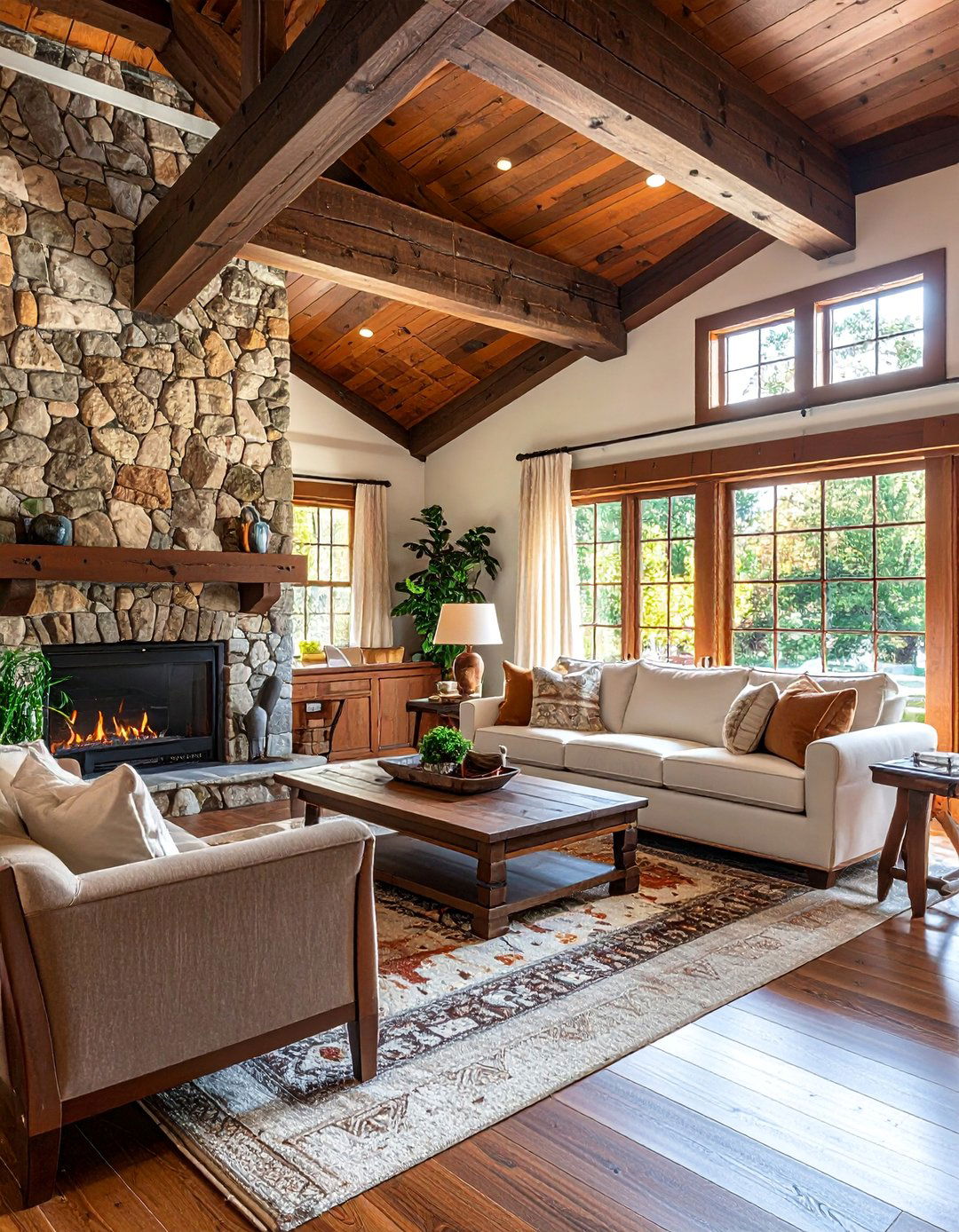
Exposed wood beams are a hallmark of Craftsman architecture, instantly adding warmth, character, and a sense of history to a living room. These structural elements draw the eye upward, making the ceiling a focal point and enhancing the room's spaciousness. For an authentic look, consider using dark-stained oak or cedar beams that contrast with a lighter-colored ceiling. The natural grain and texture of the wood bring an organic element indoors, reinforcing the Craftsman philosophy of celebrating natural materials. This feature not only provides structural beauty but also helps to define the living space, creating a cozy, lodge-like ambiance that is both grand and inviting.
2. Craftsman Fireplace with an Arts and Crafts Tile Surround
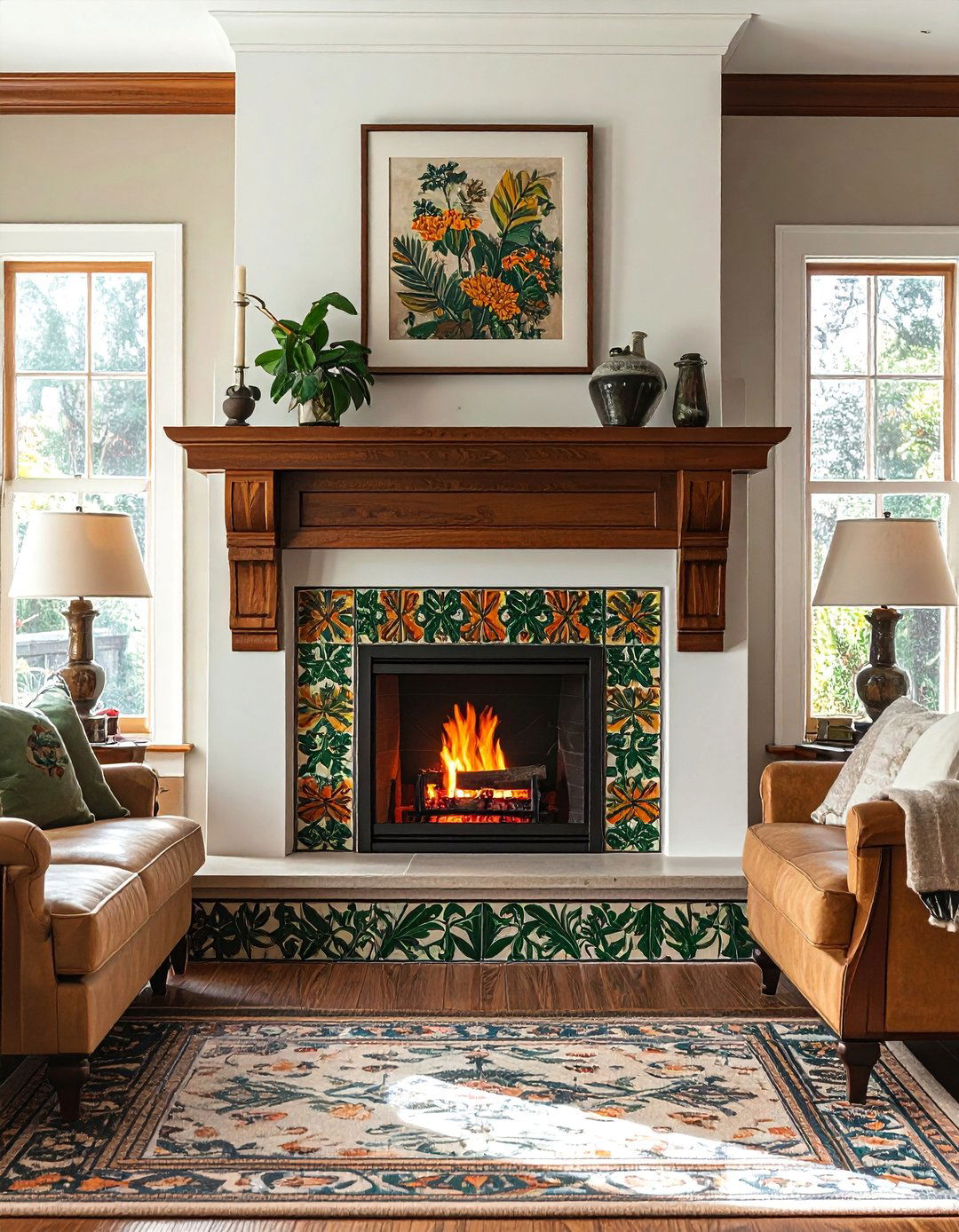
A central fireplace is often the heart of a Craftsman living room, and surrounding it with Arts and Crafts tile creates an unforgettable focal point. These handcrafted tiles, often featuring botanical motifs, geometric patterns, or earthy glazes in shades of green, blue, and ochre, embody the movement's dedication to artistry. The tile surround complements a sturdy wooden mantel, typically made from quarter-sawn oak, which can display pottery or metalwork. This combination of rugged stone or brick, artistic tile, and rich wood creates a harmonious and textured centerpiece that anchors the room and provides a warm gathering spot for family and friends.
3. Built-In Window Seats for a Craftsman Living Room
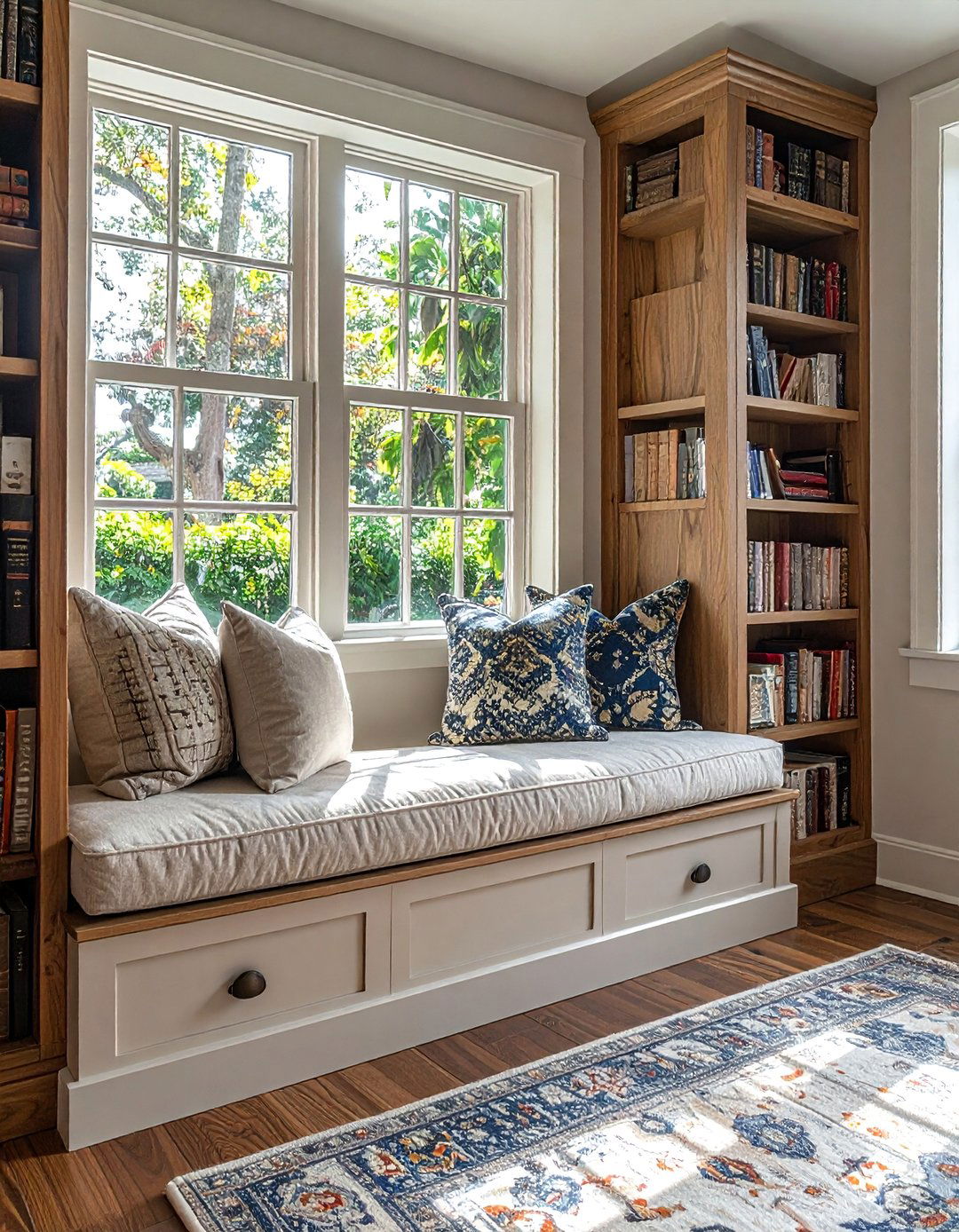
Incorporating a built-in window seat is a classic Craftsman design choice that adds charm, comfort, and practicality to a living room. Tucked into a bay window or nestled between two bookcases, a window seat creates a cozy nook perfect for reading or enjoying the view. Typically constructed from the same wood as the room's trim, it seamlessly integrates into the architecture. To enhance comfort, add a thick cushion upholstered in a durable, natural fabric like canvas or leather, and complement it with pillows in earthy tones or subtle patterns. This feature not only provides extra seating but also offers clever storage solutions with drawers or a lift-top lid underneath.
4. Mission-Style Furniture in a Craftsman Living Room
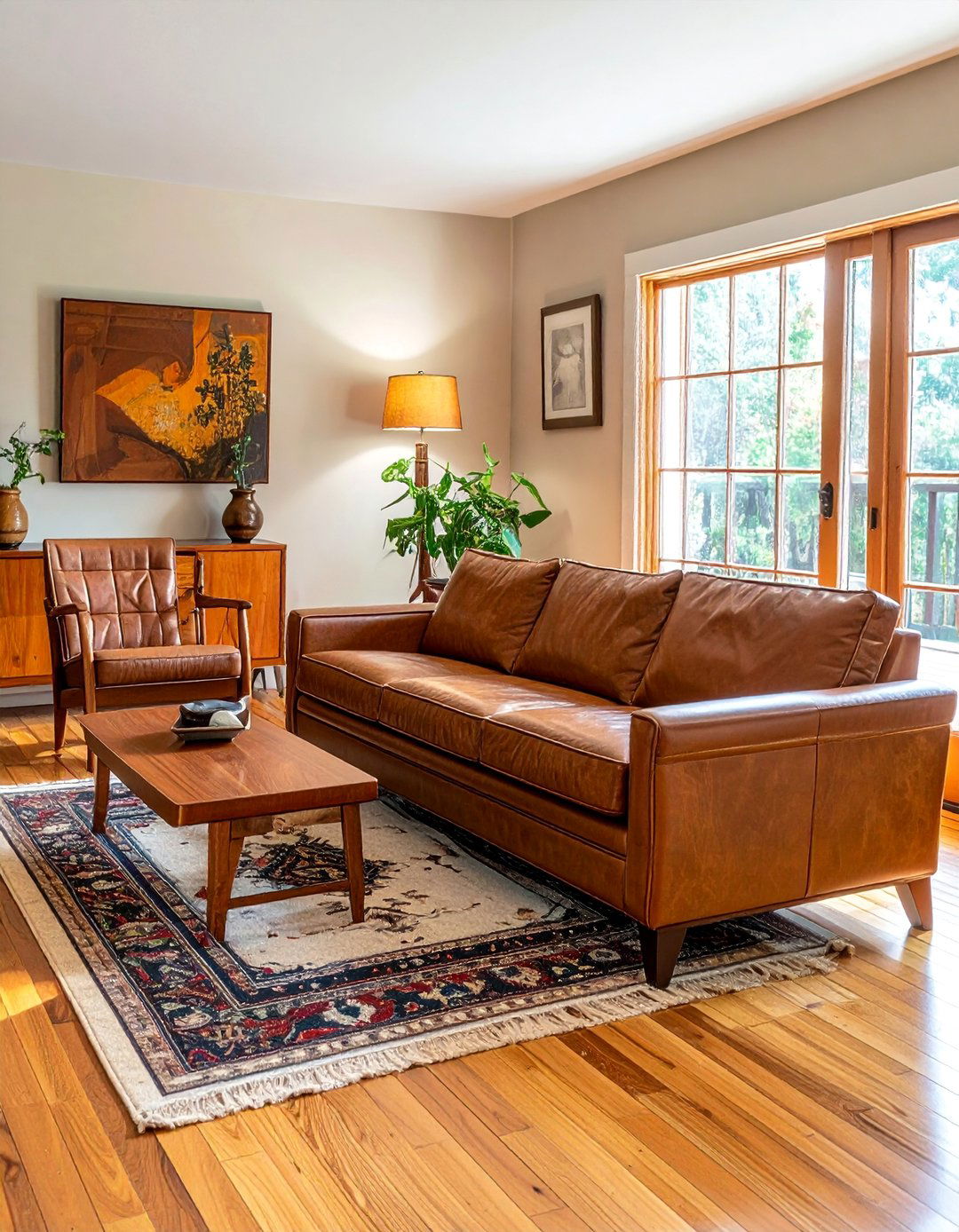
Mission-style furniture is the quintessential choice for a Craftsman living room, known for its simple, straight lines and sturdy construction. Characterized by its unadorned, flat panels and exposed joinery, this furniture style emphasizes the natural beauty of the wood, most commonly oak. A classic Mission sofa with leather cushions, paired with Morris chairs and a sturdy coffee table, creates a cohesive and authentic look. The focus on function and quality craftsmanship aligns perfectly with the Arts and Crafts philosophy. Its robust and honest design ensures that each piece is not only beautiful but also built to last, making it a timeless investment for your home.
5. Stained Glass Windows in a Craftsman Living Room
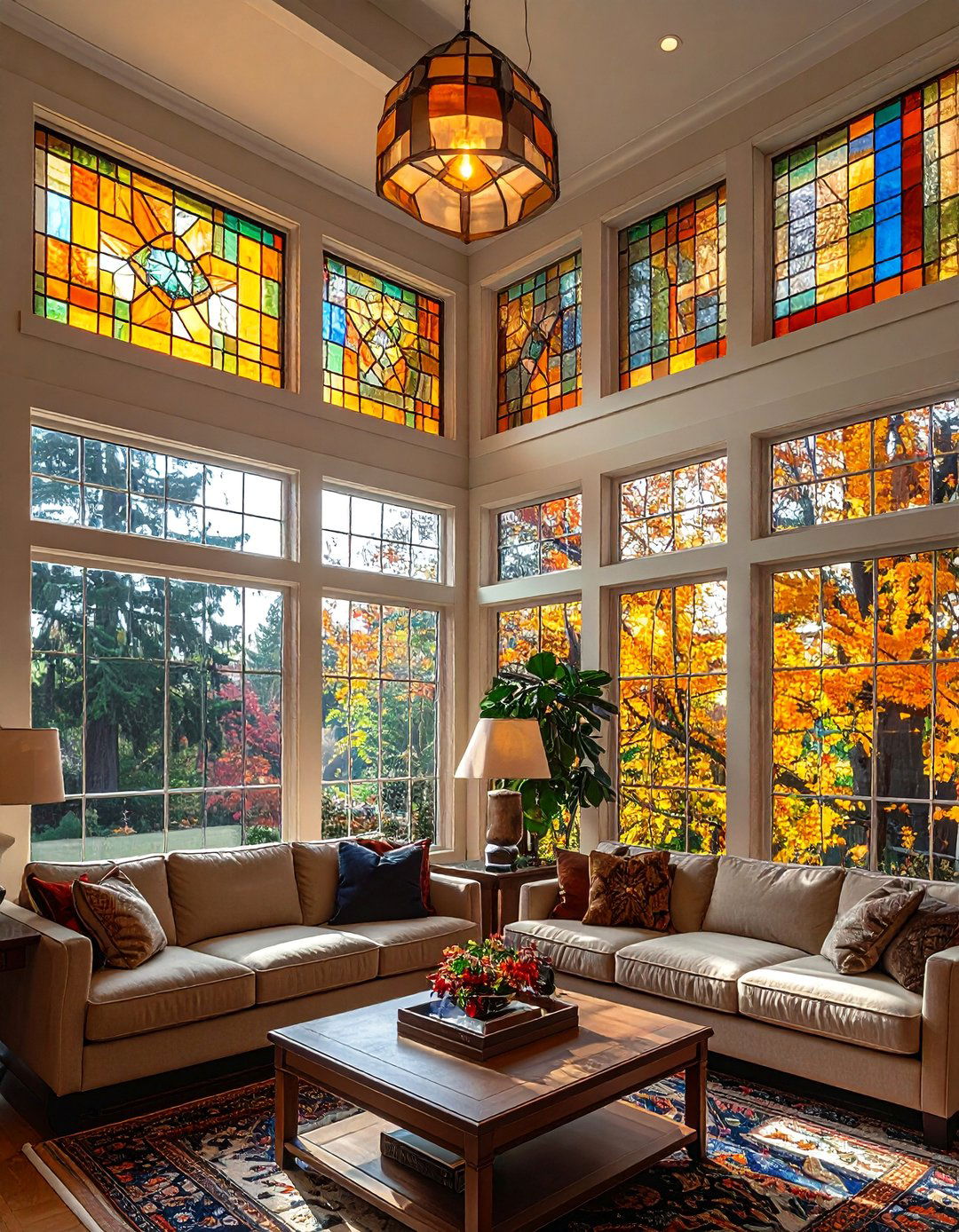
Introducing stained glass windows is a beautiful way to infuse a Craftsman living room with color, light, and artistry. Often featuring simple geometric patterns or stylized natural motifs like flowers and trees, these windows act as functional works of art. Typically placed in transom windows above larger panes or as accents alongside a fireplace, they filter daylight to cast a warm, ambient glow throughout the space. The leading in the glass complements the strong lines of the wood trim and furniture. This decorative element adds a layer of intricate detail and historical character, reflecting the movement's high regard for skilled craftsmanship and handmade beauty.
6. Craftsman Living Room with Rich Wood Paneling and Trim
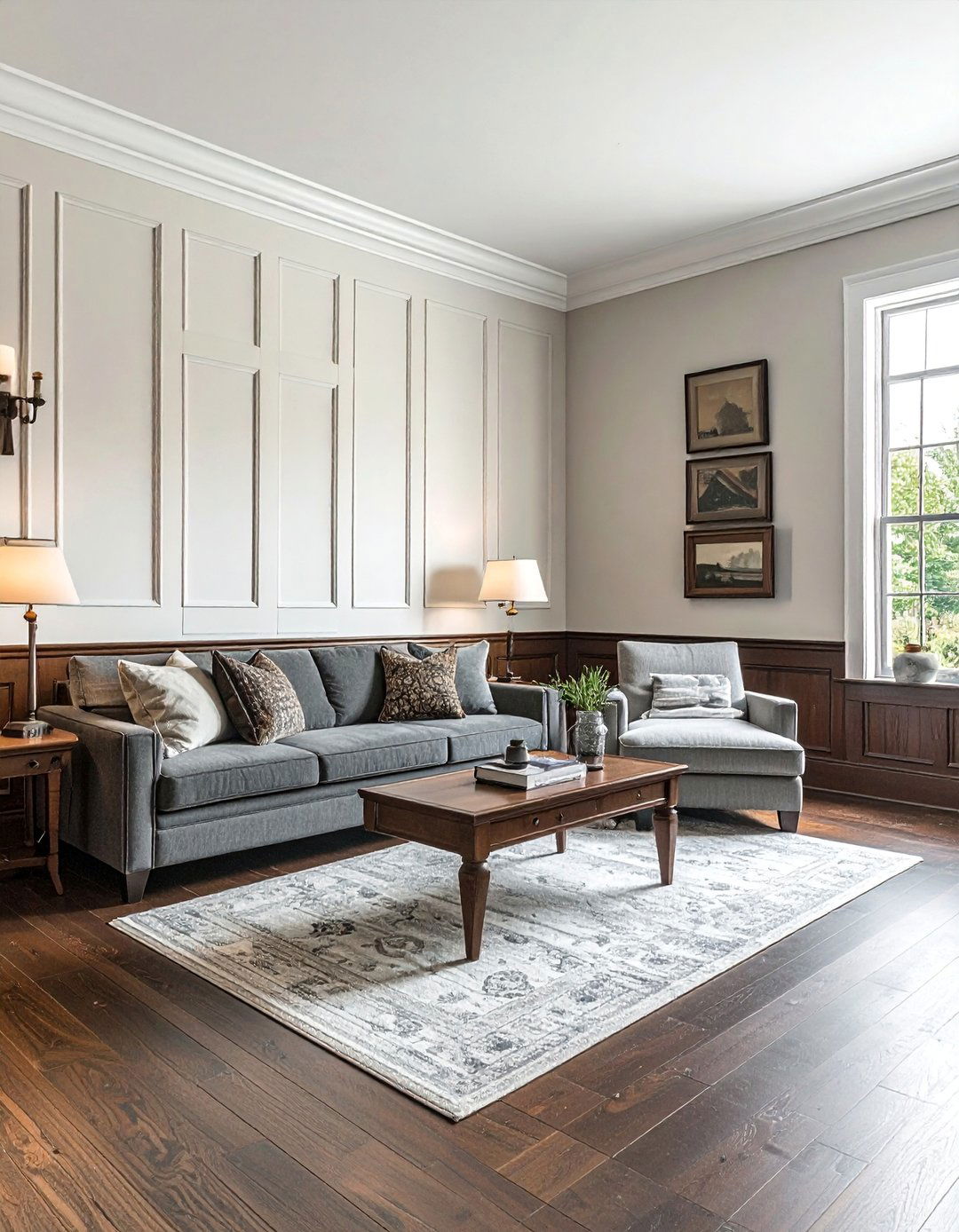
Rich wood paneling and substantial trim are defining features of a Craftsman living room, enveloping the space in warmth and natural texture. Quarter-sawn oak is the traditional choice, prized for its beautiful ray and fleck pattern. Wainscoting, picture rails, and thick door and window casings create a sense of architectural substance and cohesion. Staining the wood in a medium to dark tone enhances its grain and provides a handsome contrast to lighter-colored plaster walls above. This extensive use of woodwork is not merely decorative; it celebrates the material itself, showcasing the joinery and craftsmanship that are central to the Craftsman aesthetic, making the room feel grounded and authentic.
7. Earthy Color Palette for a Craftsman Living Room
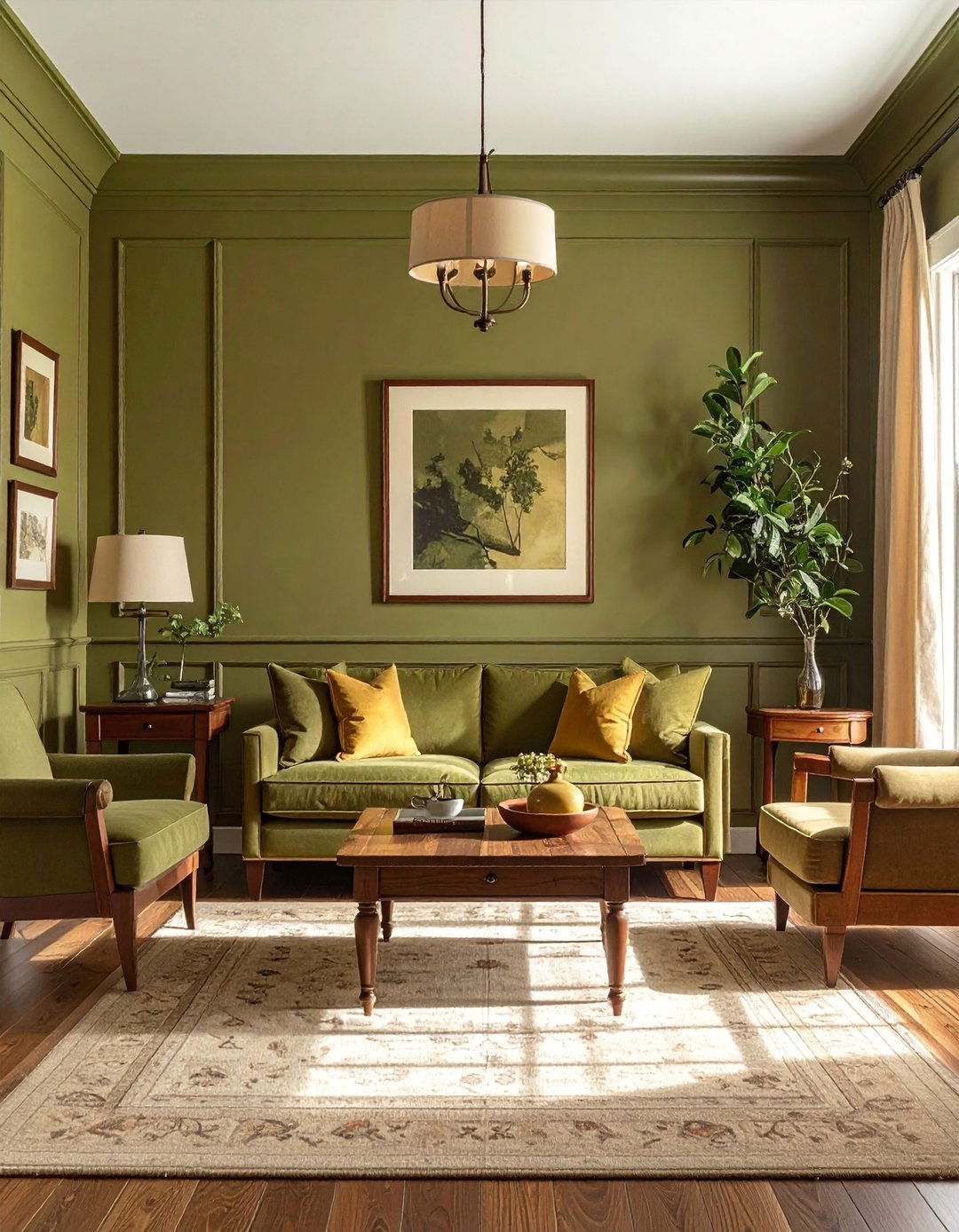
An earthy color palette is fundamental to creating an authentic Craftsman living room, drawing inspiration directly from nature. Walls are often painted in warm, muted tones such as olive green, dusty ochre, deep russet, or warm beige, which complement the rich wood tones of the trim and furniture. These colors create a calming and restorative atmosphere that feels connected to the outdoors. Accent colors can be introduced through textiles and accessories, like throw pillows, rugs, and pottery, in shades of slate blue or burgundy. This nature-inspired palette enhances the organic feel of the space, promoting a sense of harmony and tranquility that is central to the Craftsman style.
8. A Craftsman Living Room with Built-In Bookcases
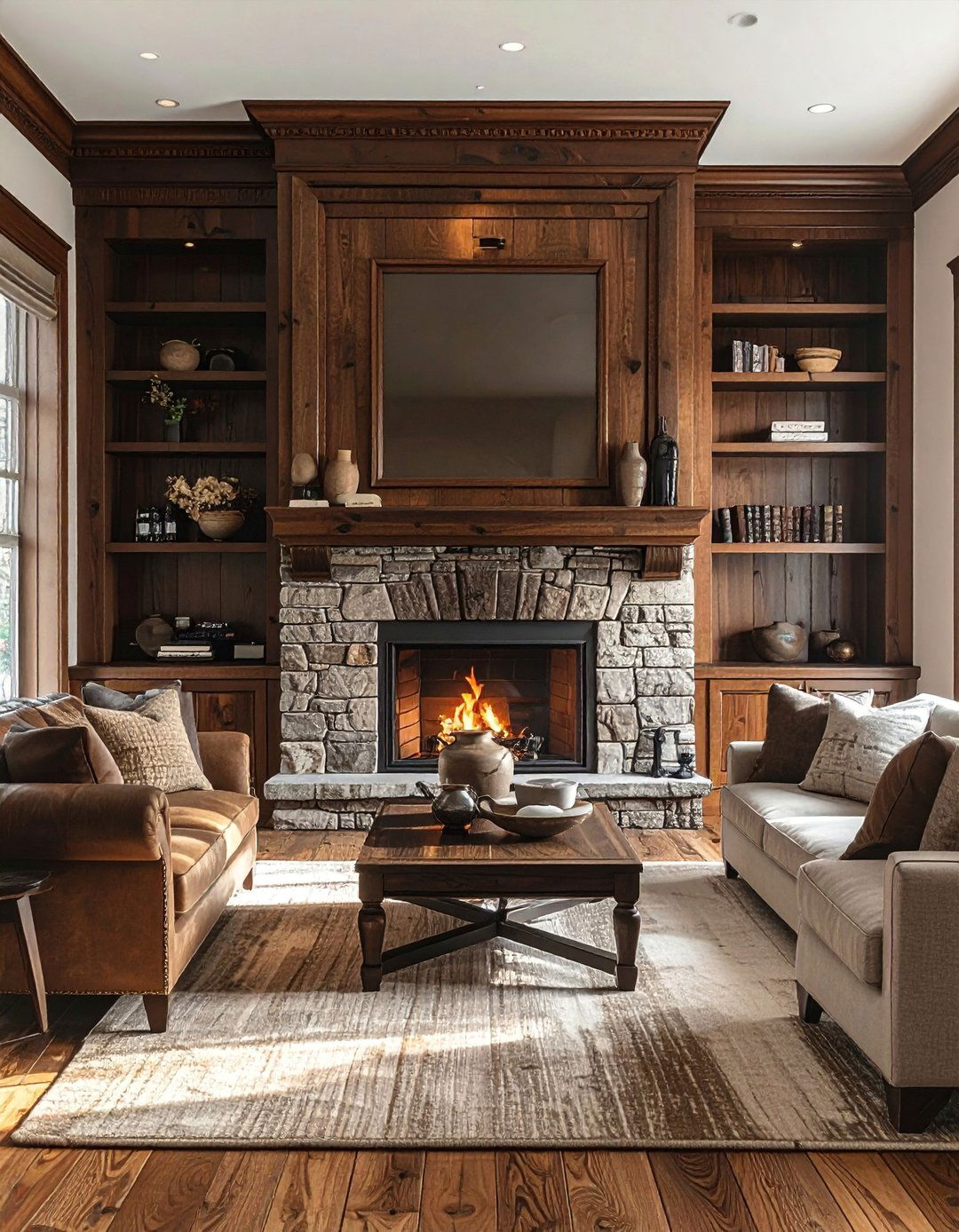
Built-in bookcases are a classic and highly functional element in a Craftsman living room, often flanking a fireplace or doorway. These floor-to-ceiling units, crafted from the same wood as the room’s trim, provide ample storage while creating a sense of architectural permanence. The sturdy shelves are perfect for displaying books, pottery, and other decorative objects that reflect the Arts and Crafts ethos. Often featuring details like glass-paneled doors on the upper cabinets or a closed storage base, these built-ins are a testament to efficient design. They not only organize the space but also add depth and character, turning a simple wall into a beautiful and intelligent feature.
9. Layered Lighting with Mica and Art Glass Fixtures
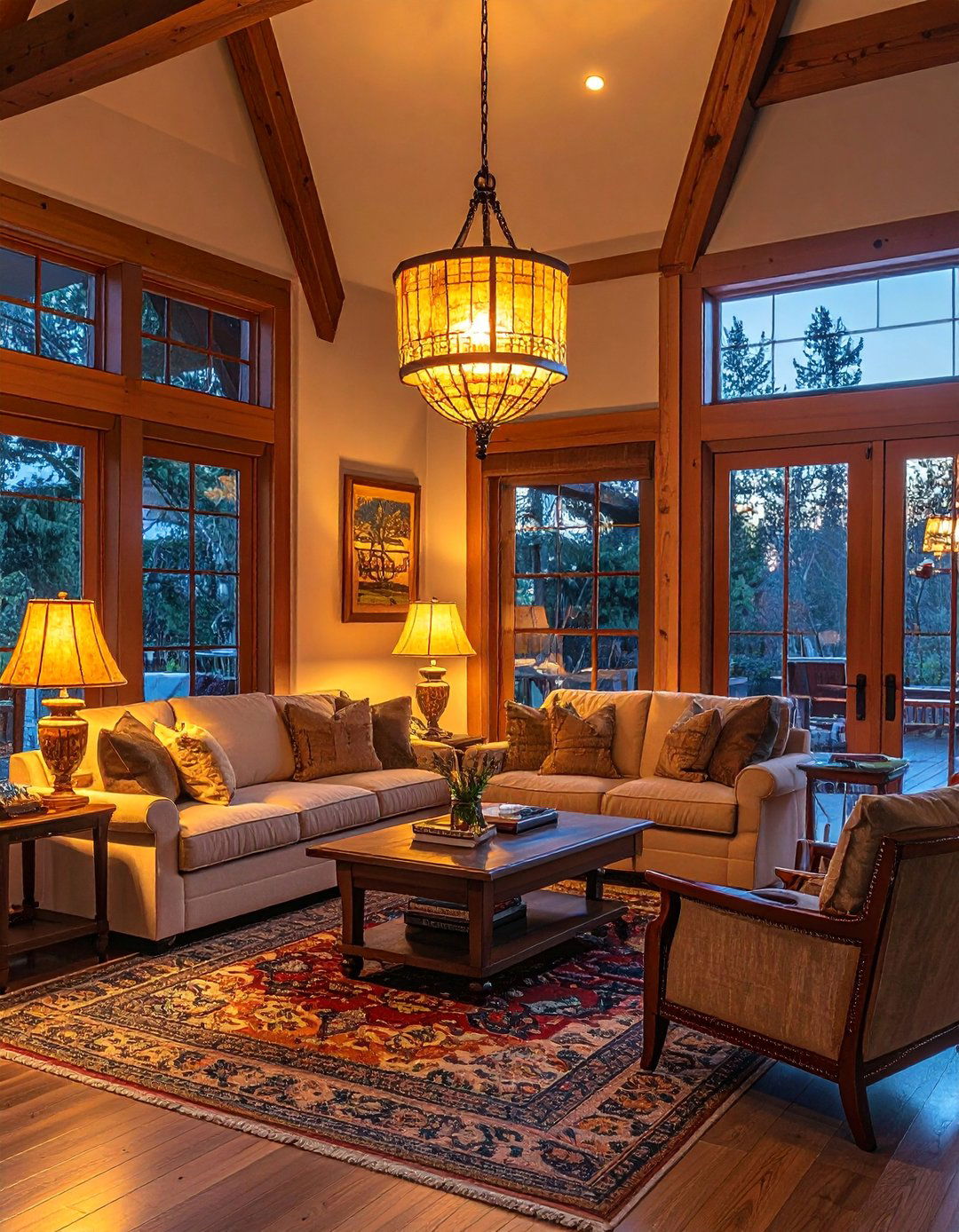
Proper lighting is crucial in a Craftsman living room, and fixtures made from mica or art glass are the perfect choice. These materials align with the style’s emphasis on natural elements and handcrafted quality. Mica lamps, with their warm, amber glow, provide a soft and diffused light that creates an inviting ambiance. Art glass chandeliers or pendant lights, often featuring designs inspired by nature or simple geometry in the style of Tiffany or Greene and Greene, serve as stunning focal points. Combining these overhead fixtures with table and floor lamps ensures a layered lighting scheme that is both functional for tasks like reading and effective in highlighting the room's architectural details.
10. A Craftsman Living Room Featuring a Tapered Column
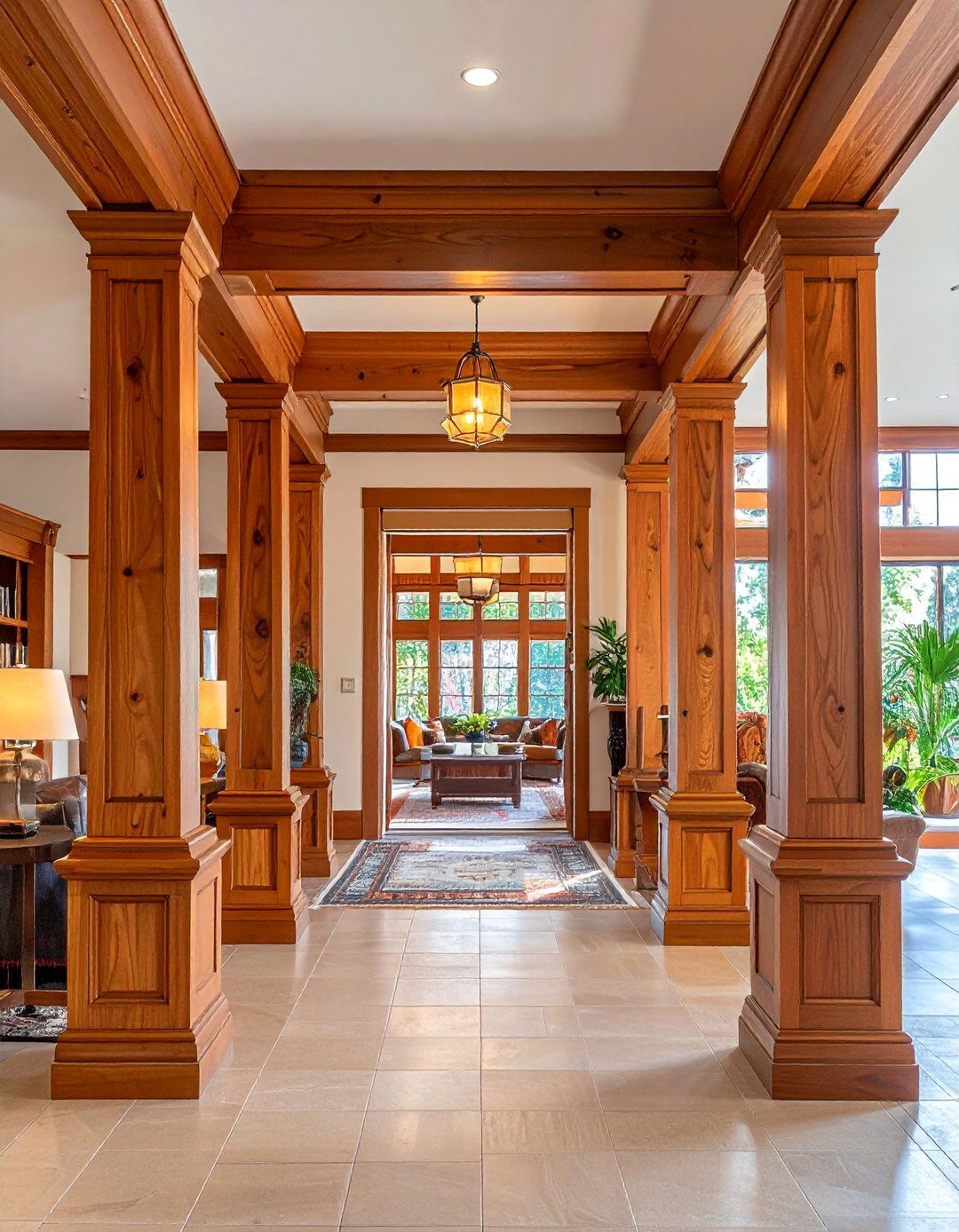
Incorporating tapered, square columns is a signature architectural element that defines the open yet structured feel of a Craftsman living room. Often used to frame the entry into the living space from a foyer or dining room, these columns are typically made of wood and sit atop a wider base, sometimes integrated into a low bookcase or wall known as a colonnade. This feature creates a graceful transition between rooms without closing them off, maintaining an open floor plan while clearly delineating different functional areas. The simple, clean lines of the tapered column reinforce the style's emphasis on strong, honest geometry and structural beauty.
11. Leather Upholstery on Craftsman Living Room Furniture
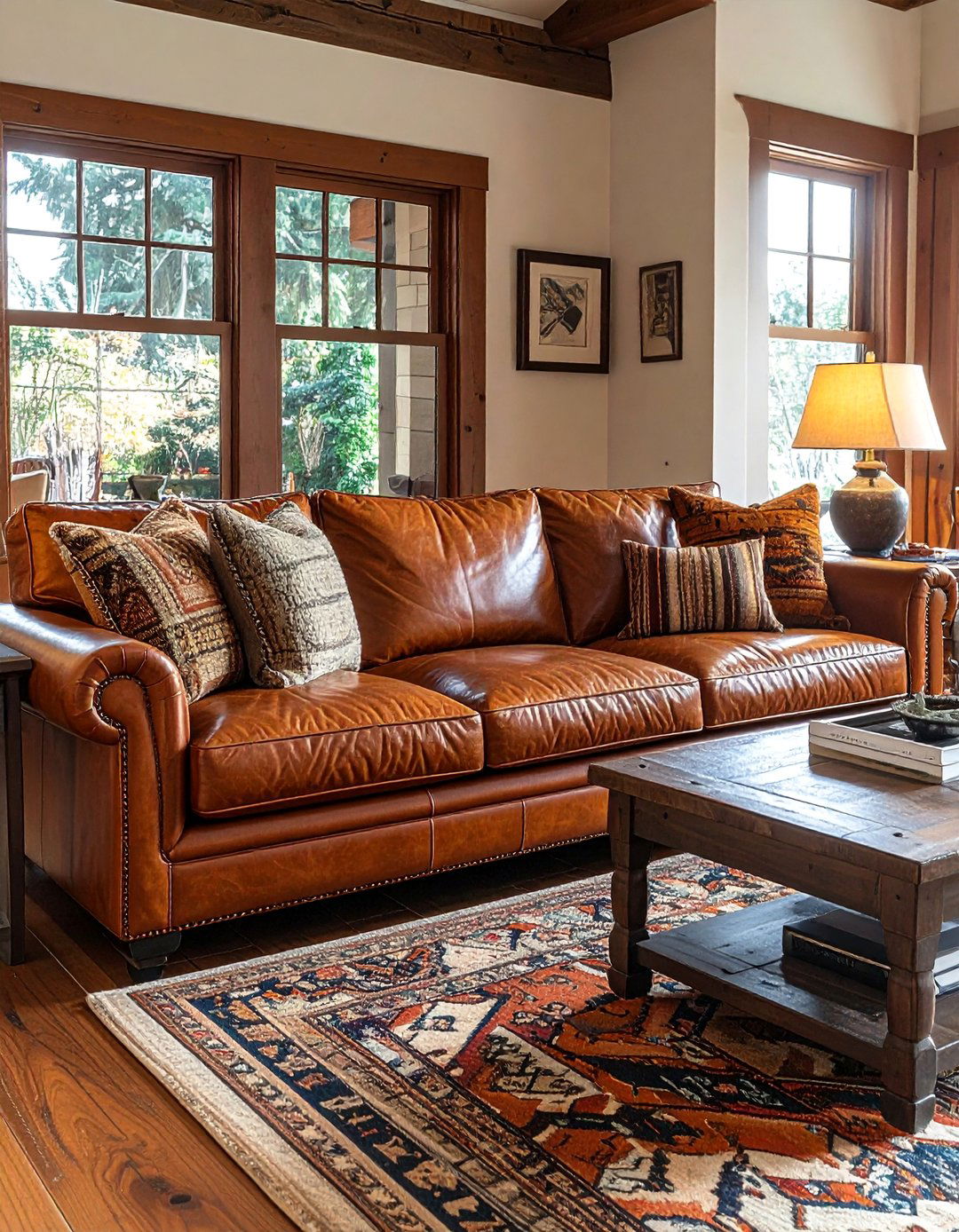
Leather upholstery is a superb choice for furniture in a Craftsman living room, offering durability, comfort, and timeless appeal. A deep brown or warm caramel leather sofa or armchair complements the rich tones of the wood trim and Mission-style furniture frames. The natural texture and patina that leather develops over time add to the room's character, reflecting the Craftsman appreciation for materials that age gracefully. Pairing leather with sturdy oak or cherry wood frames creates a look that is both rugged and refined. This choice not only enhances the cozy and inviting atmosphere but also stands up to the demands of daily life, making it a practical and stylish option.
12. Using Hand-Hammered Metalwork Accents
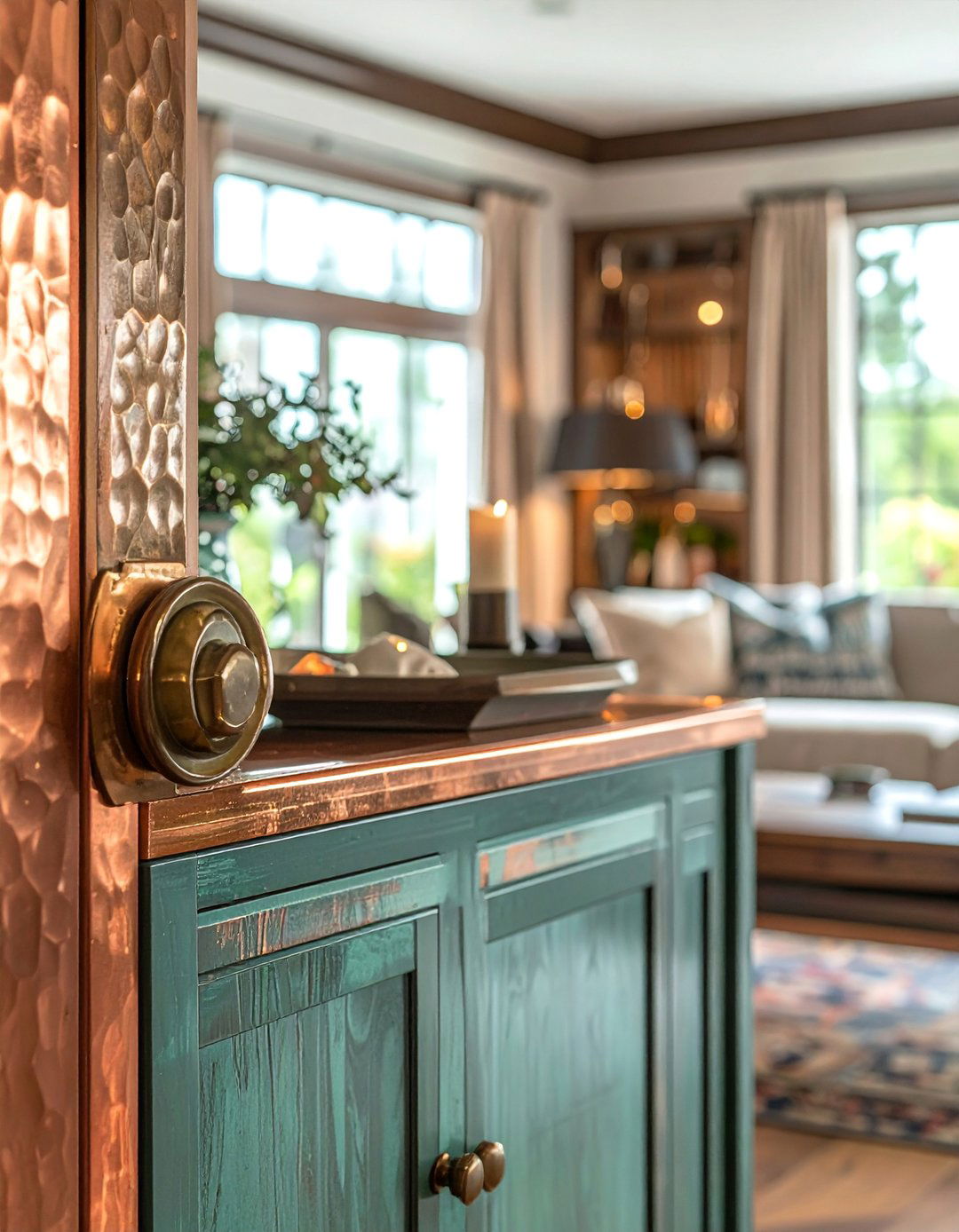
Hand-hammered metalwork is an essential accent in a Craftsman living room, showcasing the value placed on artisanal skill. Look for details in materials like copper, bronze, or blackened iron on lighting fixtures, fireplace screens, and cabinet hardware. The subtle, textured surface of hammered metal catches the light beautifully and provides a rustic yet sophisticated contrast to the smooth finish of the wood. These handcrafted metal elements add a layer of authenticity and detail, reinforcing the Arts and Crafts principle of celebrating the maker's hand. Even small touches, like drawer pulls or switch plates, can help to create a cohesive and historically accurate design scheme.
13. Area Rugs with Geometric or Botanical Patterns
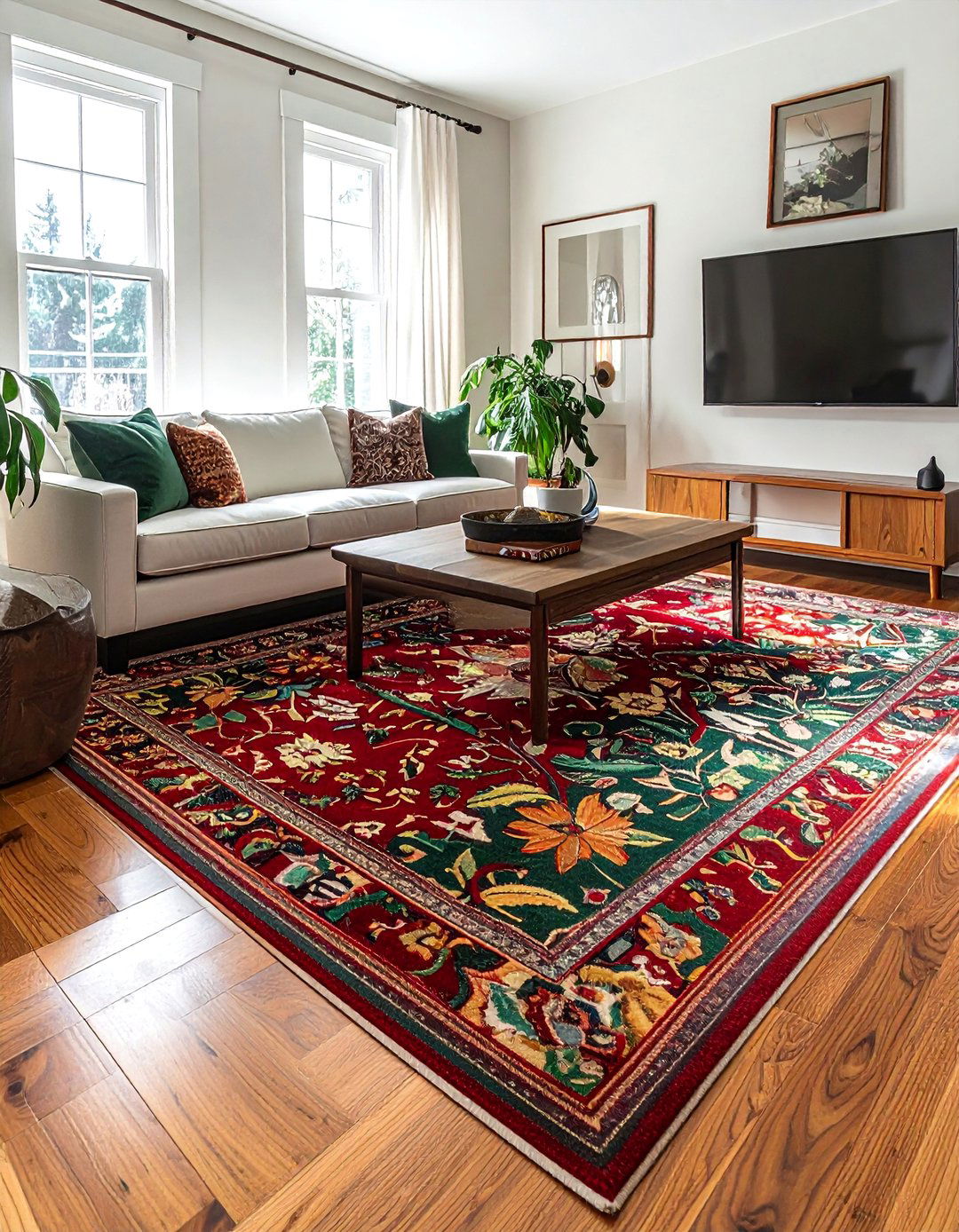
An area rug is a key element for grounding the seating area in a Craftsman living room and adding a layer of comfort and style. Choose rugs that feature geometric patterns inspired by Native American or Art Nouveau designs, or stylized botanical motifs that echo the nature-inspired theme of the movement. Colors should align with the earthy palette, incorporating deep reds, greens, golds, and browns. A high-quality wool rug not only feels luxurious underfoot but also adds texture and warmth to the space, balancing the hardness of the wood floors and furniture. The right rug can tie all the design elements together, creating a harmonious and unified look.
14. Craftsman Living Room with a Coffered Ceiling
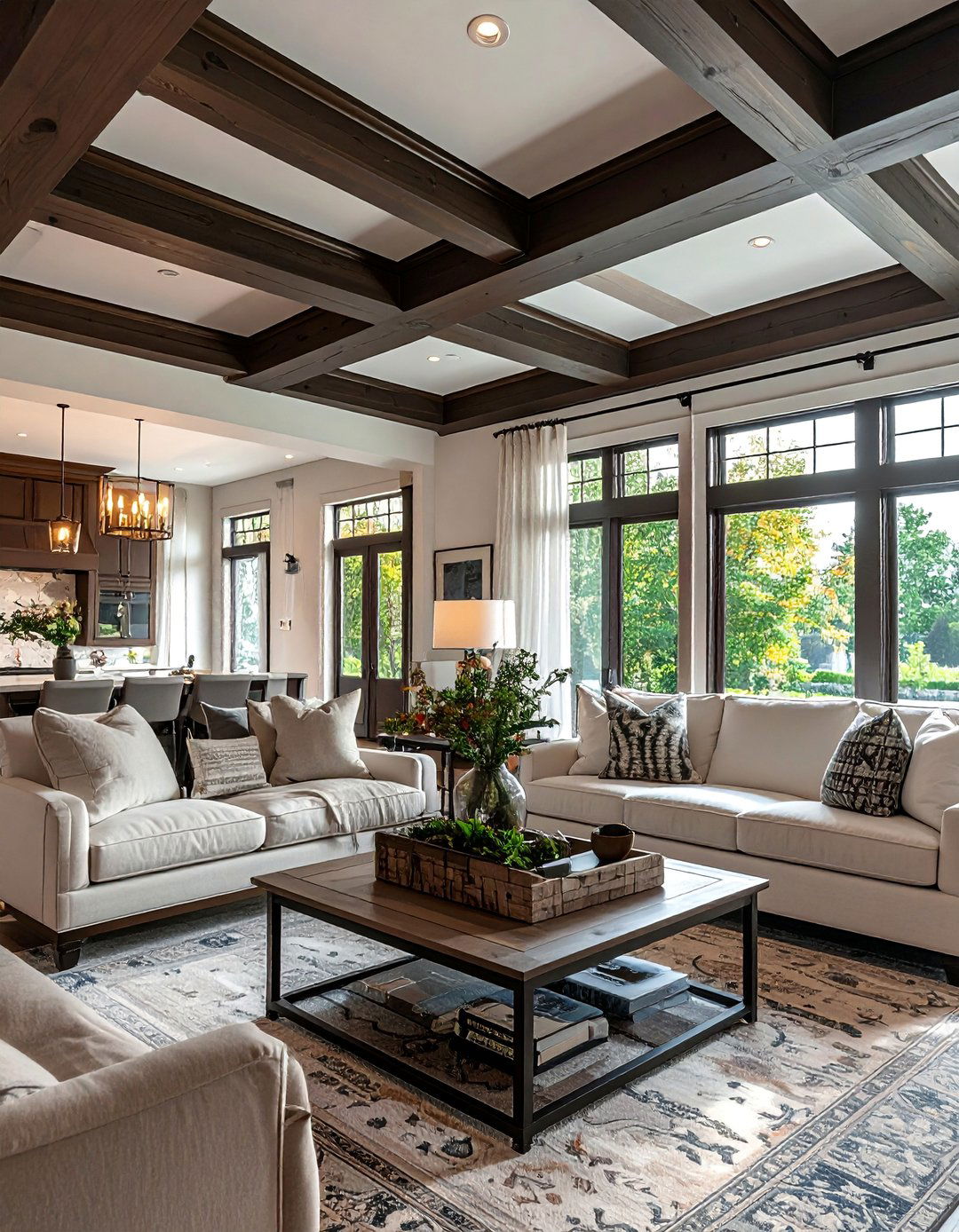
A coffered ceiling adds architectural depth and sophistication to a Craftsman living room, elevating the space with its grid of recessed panels. The coffers are typically formed by intersecting beams, all crafted from the same rich wood used for the room's trim and built-ins. This treatment adds a sense of grandeur and historical character, drawing the eye upward and making the room feel more spacious. Within each panel, you can add subtle lighting or paint the surface a slightly lighter shade to create contrast. A coffered ceiling is a powerful statement that complements the strong lines and structural honesty of Craftsman design, turning the "fifth wall" into a stunning feature.
15. Displaying Arts and Crafts Pottery and Artwork
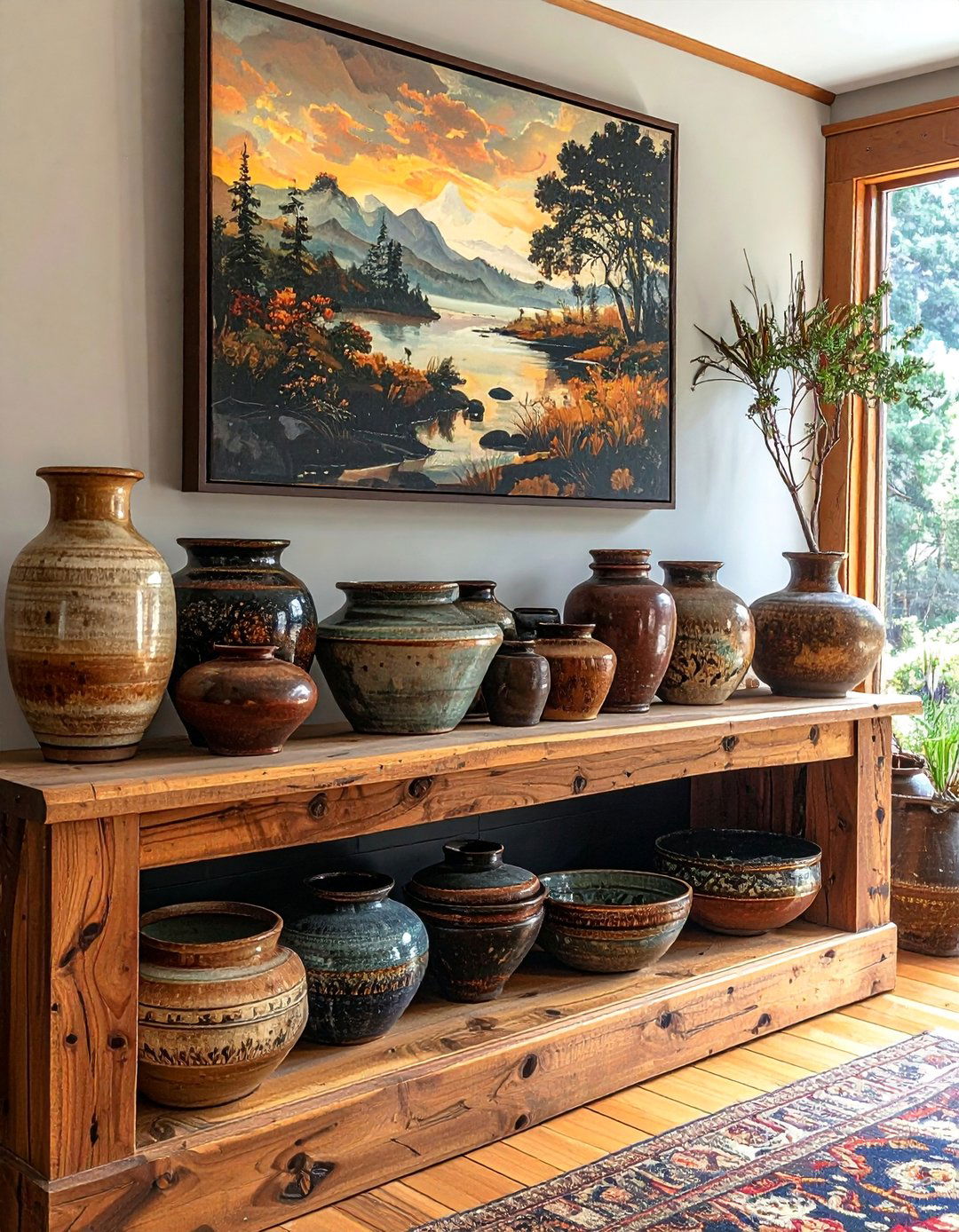
Showcasing Arts and Crafts pottery and artwork is a wonderful way to personalize a Craftsman living room and honor the movement's artistic roots. Display handcrafted ceramic vases from makers like Rookwood or Grueby on the mantelpiece, built-in shelves, or side tables. Their simple forms and rich, earthy glazes perfectly complement the style. On the walls, hang period-appropriate art, such as landscape paintings, botanical prints, or woodblock prints that celebrate nature. These carefully chosen pieces add color, texture, and a sense of history, reinforcing the idea that a home should be filled with objects that are both beautiful and meaningful.
16. Craftsman Living Room with Simple, Natural Window Treatments
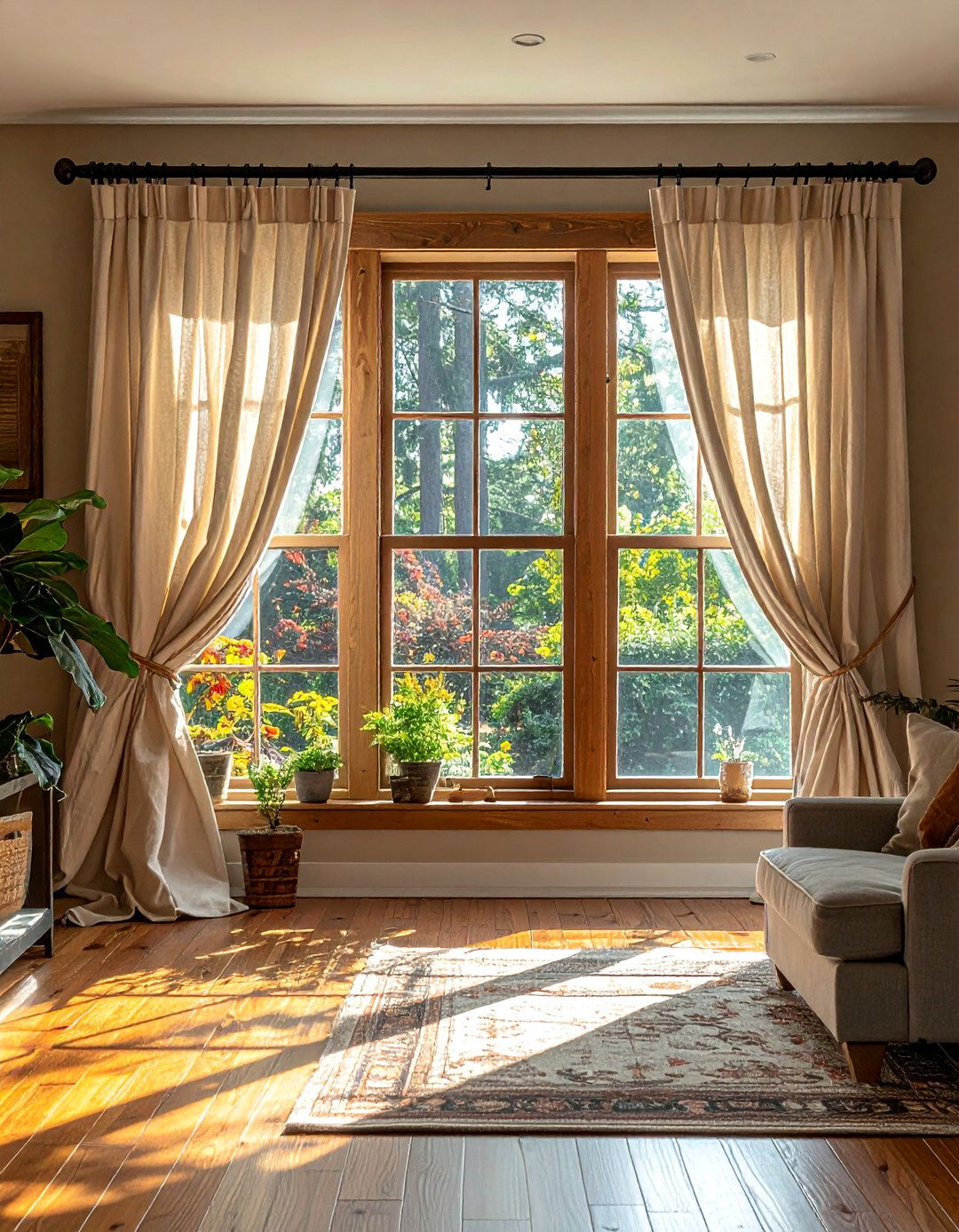
Window treatments in a Craftsman living room should be simple and functional, designed to complement the beautiful wood trim rather than conceal it. Avoid heavy, ornate draperies and opt instead for clean-lined curtains made from natural materials like linen, cotton, or raw silk. Hanging simple panels from a wooden or iron rod allows them to frame the window without overwhelming it. Another excellent option is bamboo or matchstick blinds, which filter light beautifully and add a natural, organic texture. The goal is to maintain a connection to the outdoors and allow plenty of natural light to fill the room, highlighting the craftsmanship of the window casings.
17. A Craftsman Living Room with a Morris Chair
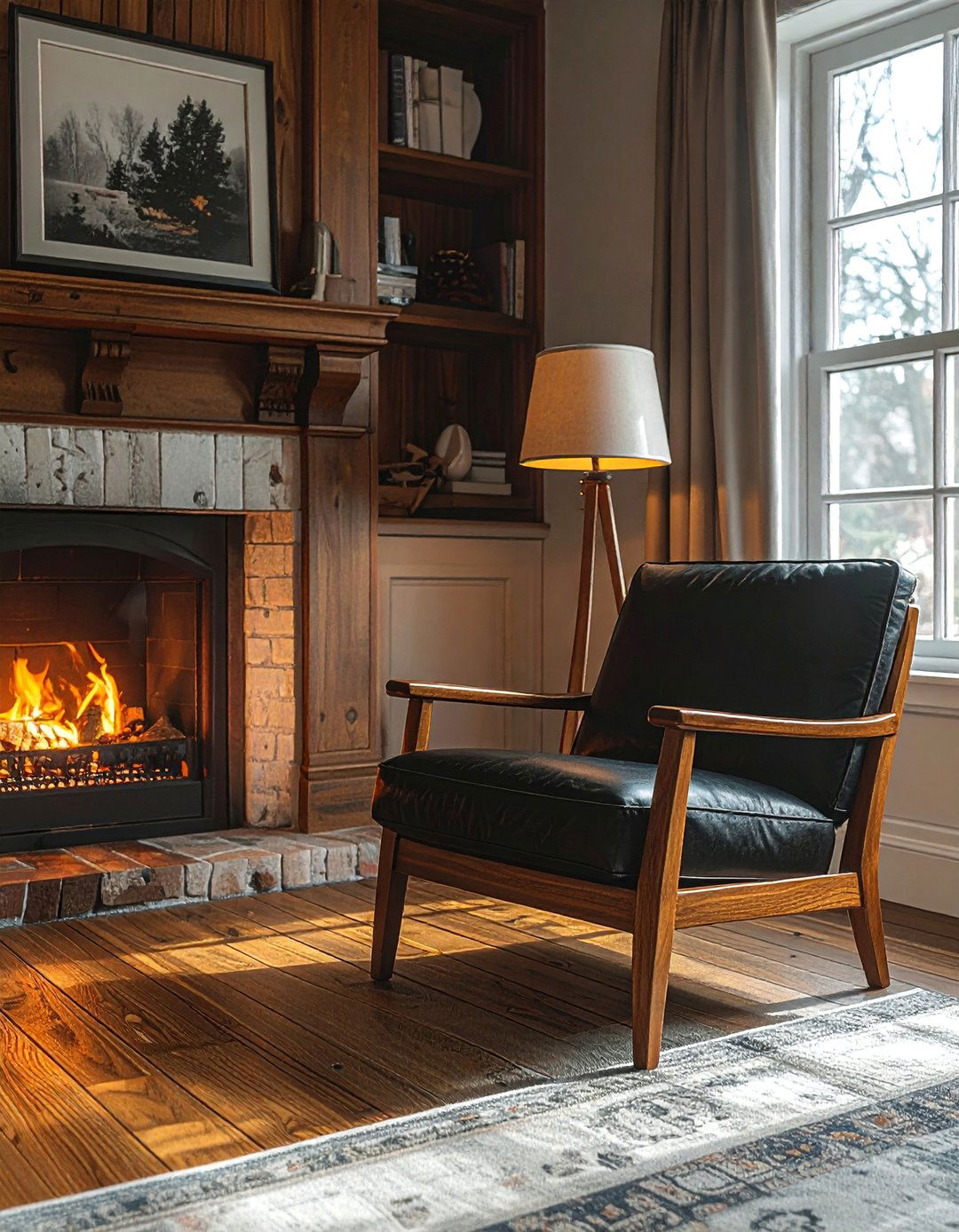
The Morris chair is an iconic piece of furniture that finds its perfect home in a Craftsman living room. Designed for comfort, it features an adjustable reclining back, wide armrests, and loose cushions, making it the ideal spot for reading or relaxing. Its sturdy wooden frame, often made of quarter-sawn oak, showcases exposed joinery and simple, strong lines that are emblematic of the Arts and Crafts movement. Upholstered in leather or a durable, textured fabric in an earthy tone, the Morris chair combines functionality with understated elegance. Placing one near the fireplace or a window creates a cozy and inviting corner that embodies the spirit of Craftsman comfort.
18. Integrating a Sturdy Wooden Mantelpiece
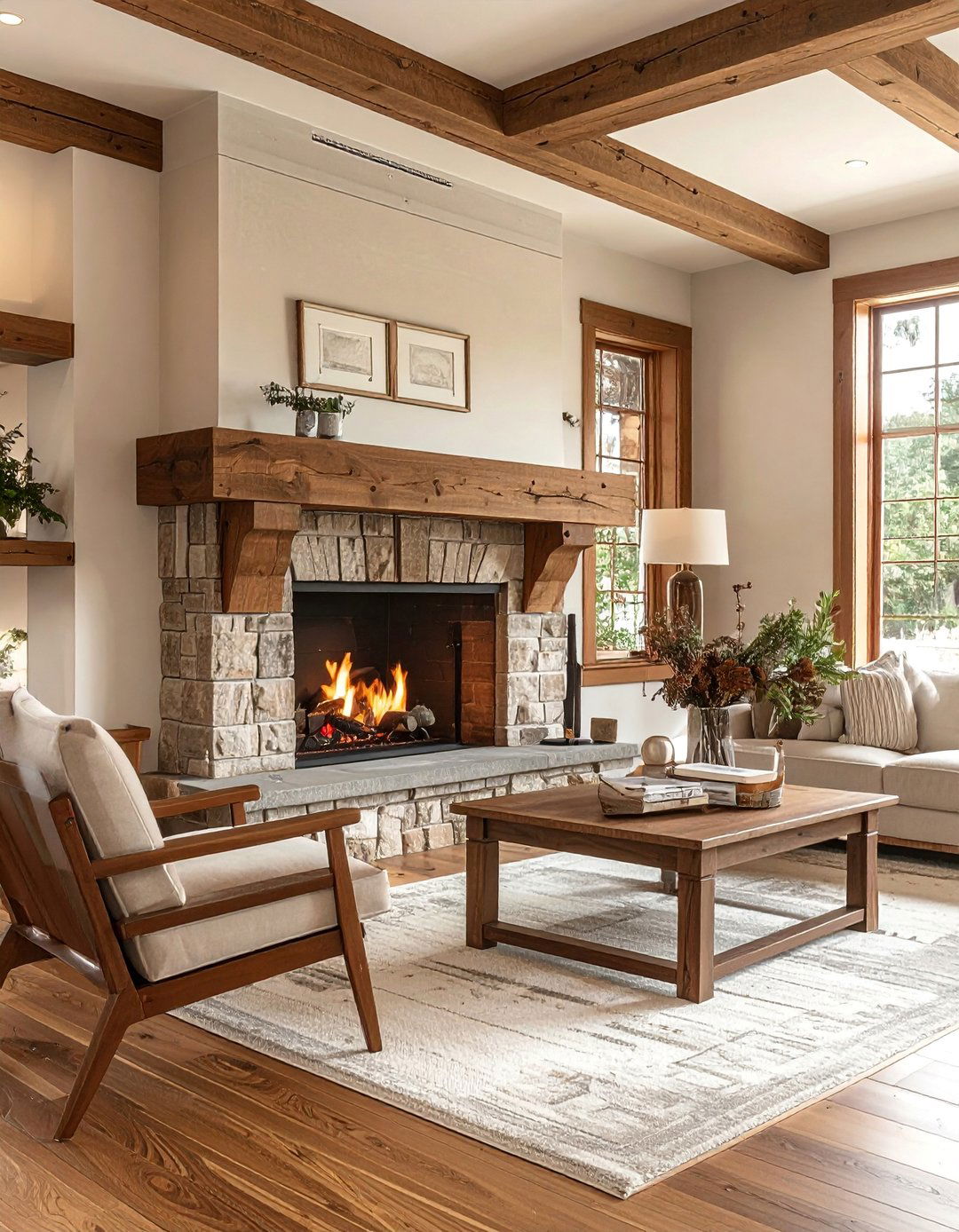
A sturdy wooden mantelpiece is the crowning feature of a Craftsman fireplace, serving as both an architectural anchor and a display space. Typically crafted from a substantial piece of oak, cherry, or other hardwood, the mantel should have a simple, linear design, often with corbels or dentil molding for subtle detail. The wood is usually stained to match the room's trim, creating a cohesive look. This robust shelf is the perfect place to showcase handcrafted pottery, a vintage clock, or a piece of metalwork. Its solid presence reinforces the Craftsman values of strength, simplicity, and natural beauty, making the fireplace the undeniable heart of the living room.
19. Using Textiles with Modest, Nature-Inspired Patterns
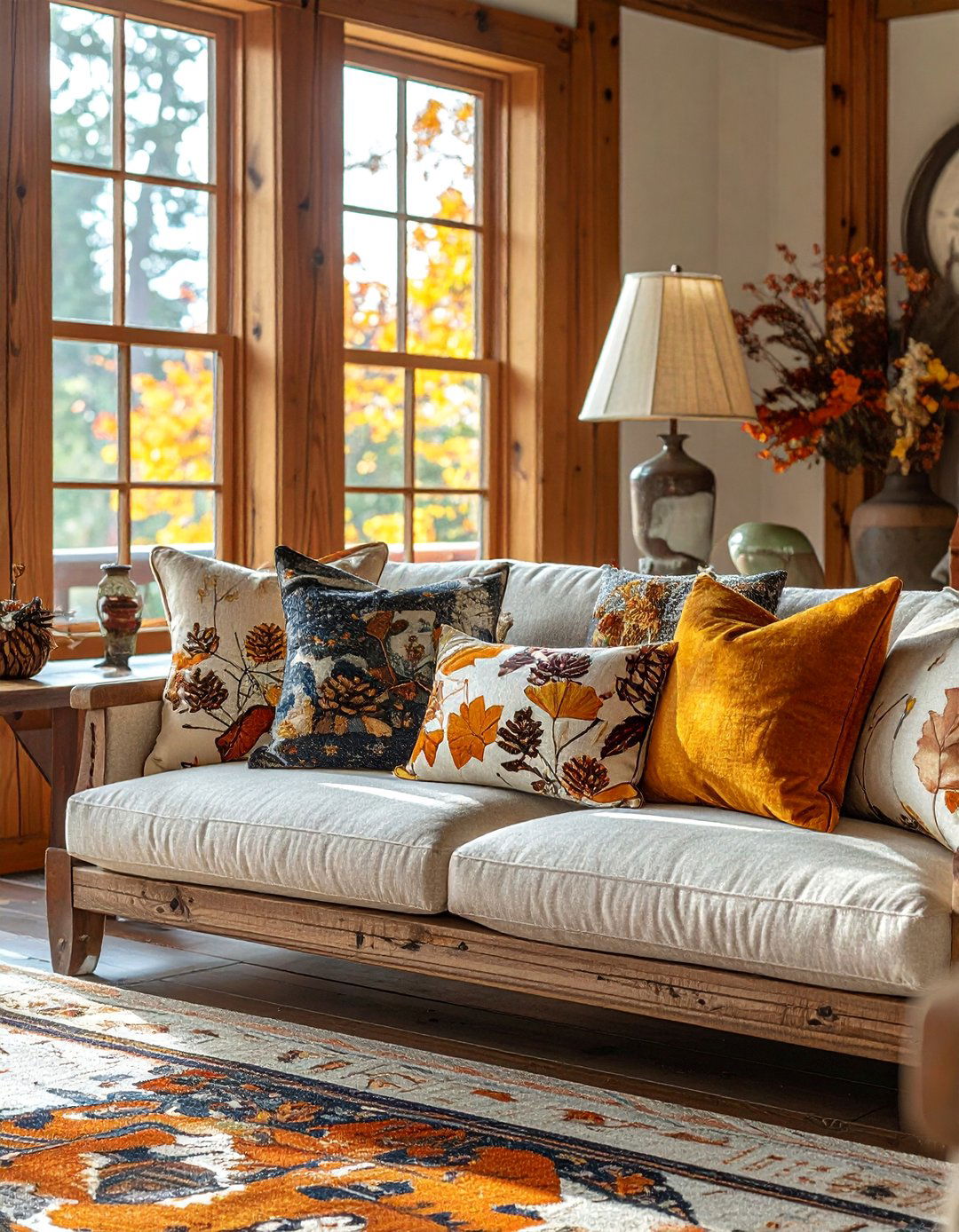
Textiles play a crucial role in softening the strong lines and hard surfaces of a Craftsman living room. Choose fabrics with modest, stylized patterns inspired by nature, such as ginkgo leaves, pinecones, or simple florals. These designs can be incorporated through throw pillows, upholstery, and window treatments. Materials should be natural and textured, like linen, wool, or embroidered cotton. The color palette for textiles should harmonize with the room's earthy tones, using shades of green, brown, blue, and terracotta. These thoughtfully chosen fabrics add a layer of visual interest, comfort, and handcrafted charm without detracting from the room's architectural integrity.
20. Craftsman Living Room with Wall Sconces
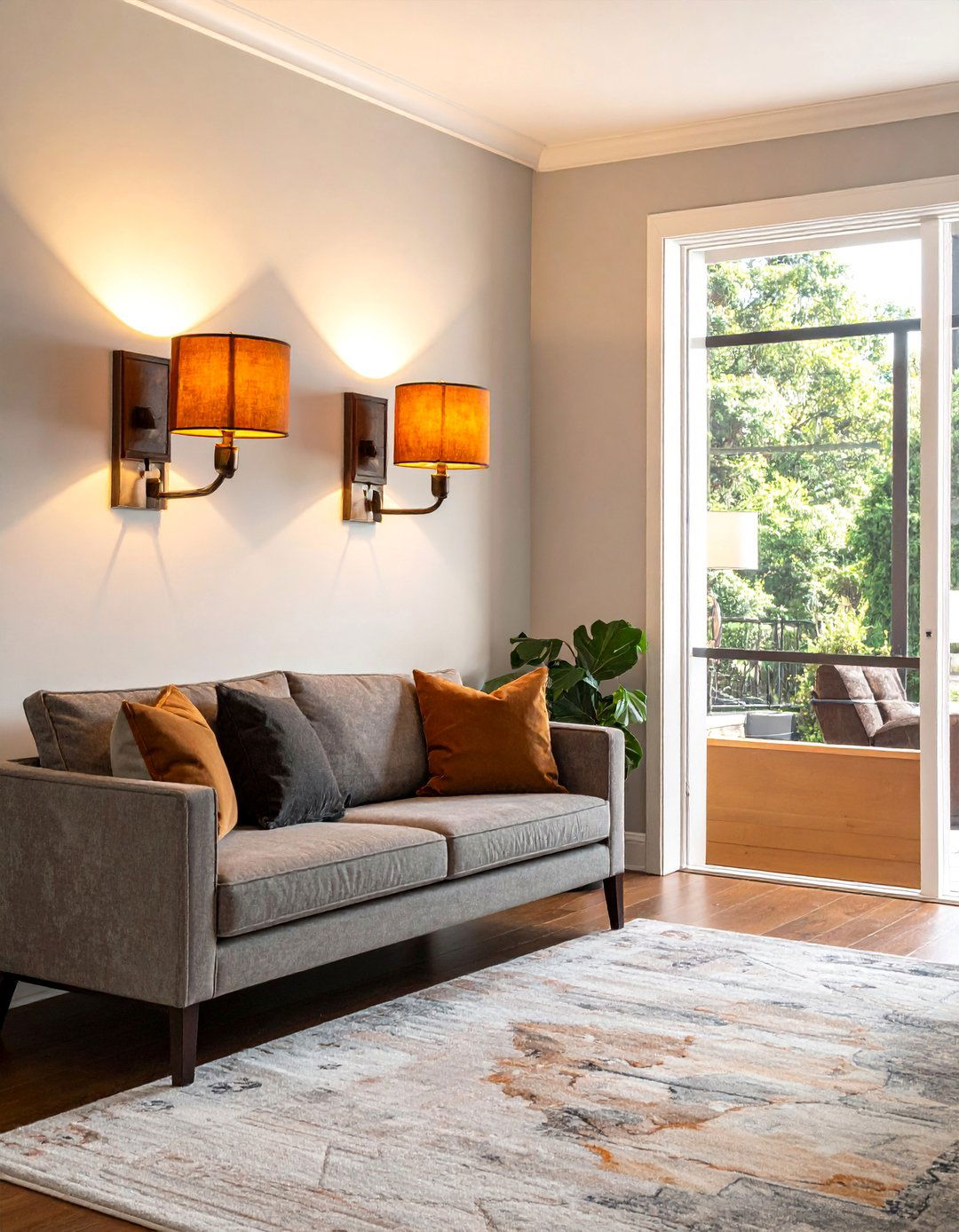
Wall sconces are an excellent lighting choice for a Craftsman living room, providing ambient light while enhancing the architectural details. Select fixtures made from materials characteristic of the style, such as hammered copper, dark bronze, or wrought iron, paired with shades of mica or amber art glass. Placed strategically on either side of a fireplace, doorway, or a large piece of art, they create a warm, inviting glow and add a sense of symmetry and balance. The soft, diffused light from these sconces highlights the texture of the walls and the richness of the wood trim, contributing to the room’s cozy and intimate atmosphere.
21. Open Floor Plan with Craftsman Details
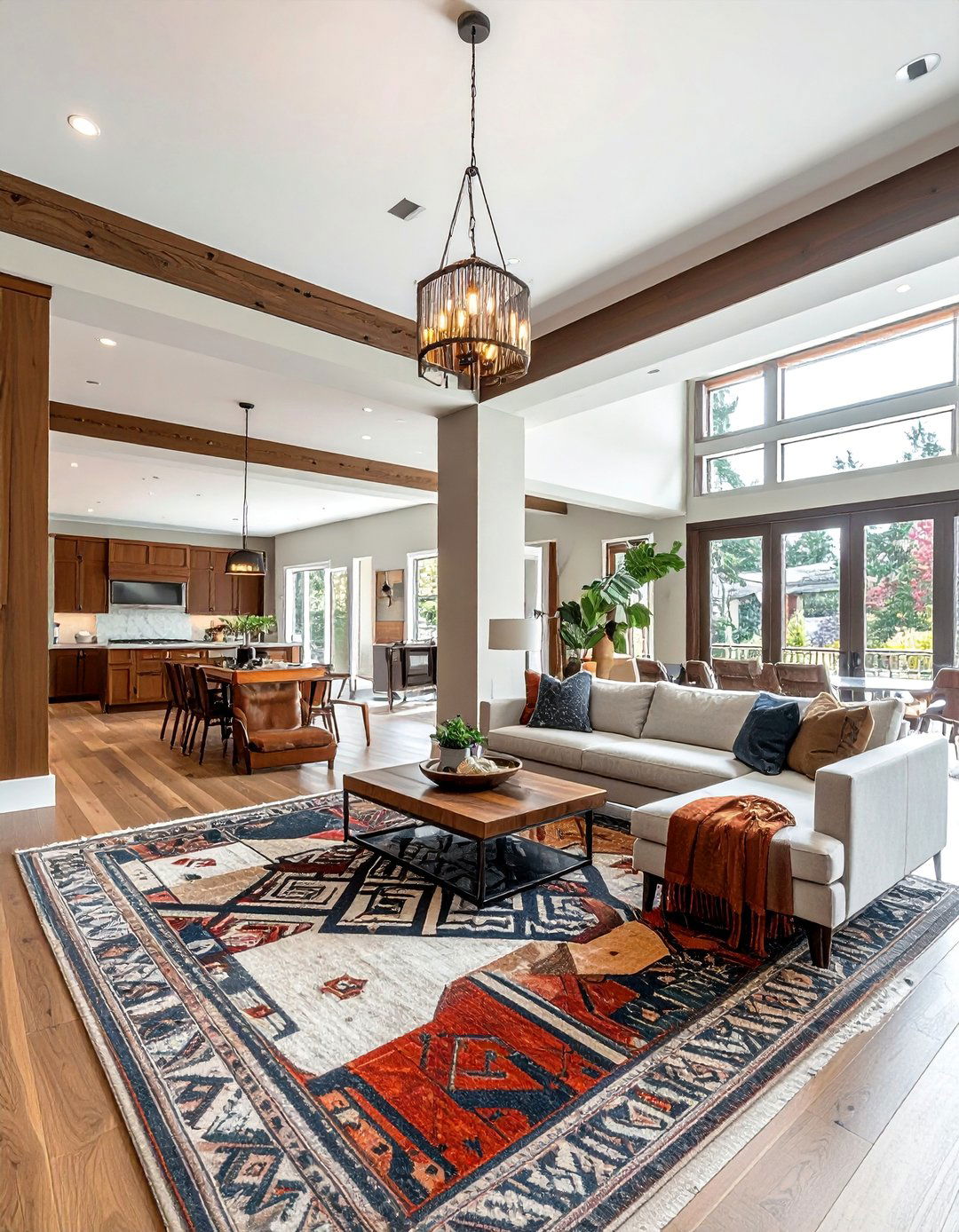
Many modern homes feature open floor plans, and you can easily apply Craftsman principles to define the living room area within a larger space. Use architectural elements like colonnades with built-in bookcases or a change in ceiling height to create a sense of separation without walls. A large, patterned area rug can anchor the seating arrangement, visually cordoning it off from the dining or kitchen area. Consistently using Craftsman elements like wood trim, Mission-style furniture, and an earthy color palette throughout the open space ensures a cohesive and harmonious design. This approach allows you to enjoy a spacious, modern layout while embracing the warmth and character of the Craftsman style.
22. Focus on Handcrafted Decor and Accessories
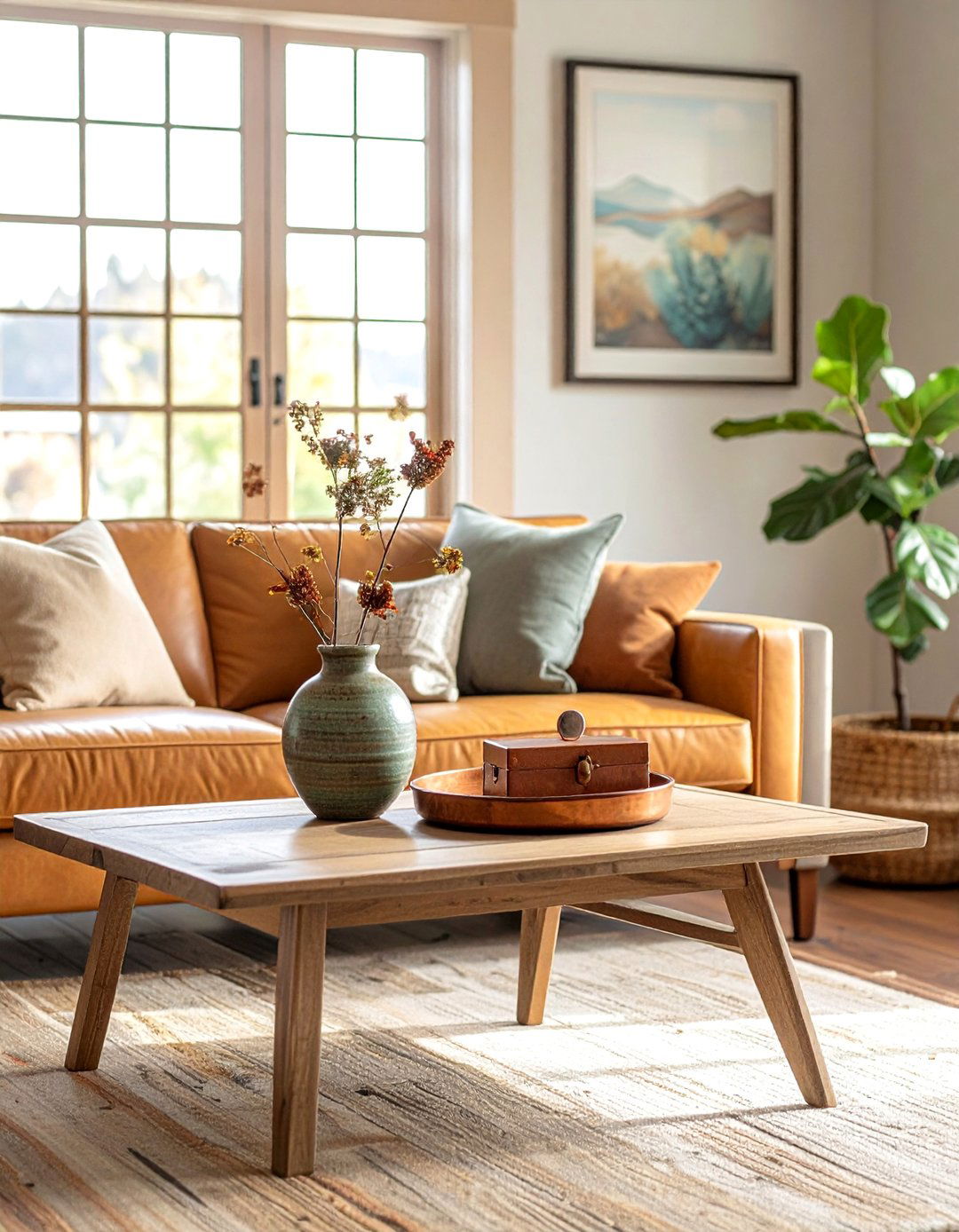
Accessorizing a Craftsman living room is about quality over quantity, with a focus on handcrafted items. Decorate with objects that showcase artisanal skill and natural materials. This could include hand-thrown pottery, tooled leather boxes, hammered copper trays, or embroidered textiles. Avoid clutter and instead choose a few meaningful pieces to display on shelves, the mantel, or coffee tables. These items not only add personal character to the space but also pay homage to the Arts and Crafts movement's core belief in the value of the handmade. Each accessory should contribute to the room's overall sense of warmth, authenticity, and thoughtful design.
23. A Craftsman Living Room with Quarter-Sawn Oak
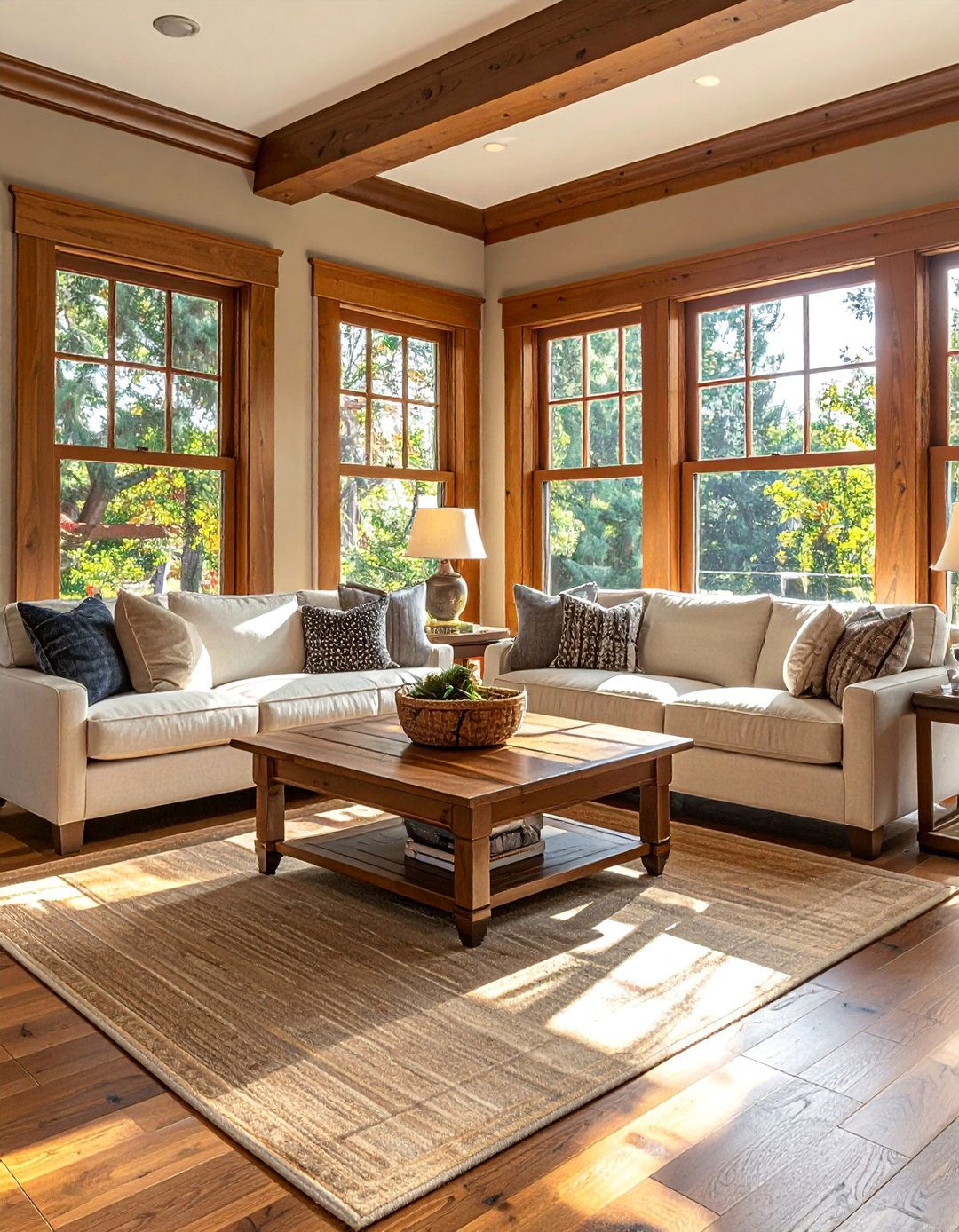
Quarter-sawn oak is the quintessential wood of the Craftsman style, and its use in a living room immediately establishes an authentic look. This method of cutting the log reveals a beautiful and distinctive grain pattern of rays and flecks, adding visual texture and depth. Use it for flooring, trim, built-in cabinetry, and furniture frames. The wood's durability and timeless appeal make it a practical and beautiful choice. Staining it in a medium to dark finish enhances the grain and imparts a warm, rich glow that is characteristic of Craftsman interiors. The prominent use of quarter-sawn oak is a direct celebration of natural materials and fine woodworking.
24. A Library Wall in a Craftsman Living Room
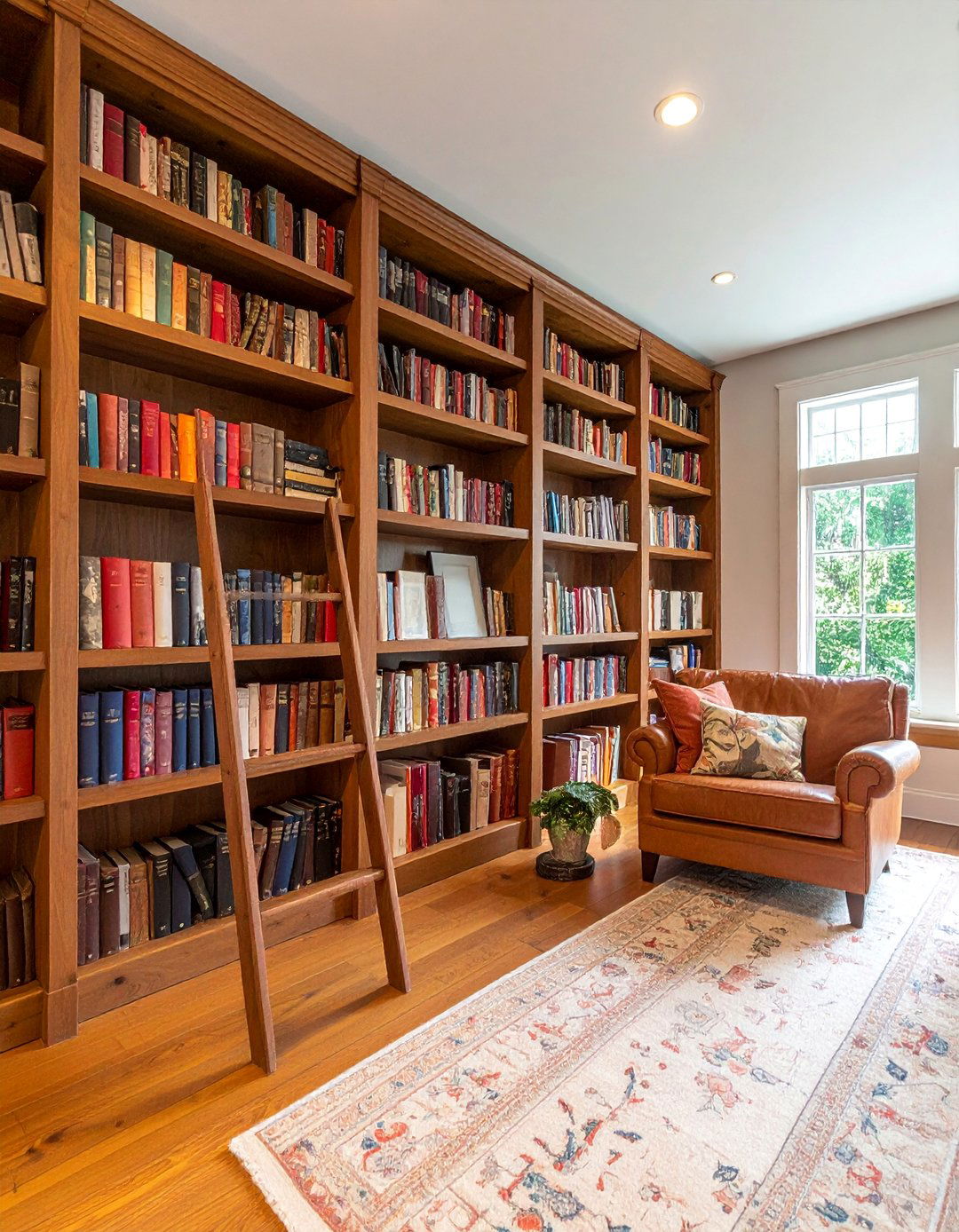
For book lovers, dedicating an entire wall to floor-to-ceiling bookshelves can transform a Craftsman living room into a cozy and intellectual retreat. This library wall, crafted from rich oak to match the room’s trim, becomes a stunning focal point. Incorporate a rolling ladder for both function and vintage charm. The visual impact of rows of books adds color, texture, and personality, creating a space that feels deeply personal and lived-in. You can break up the shelves with a central spot for a piece of art or integrate a cozy reading nook with a built-in bench. This feature perfectly blends the Craftsman emphasis on built-in functionality with a love for knowledge and artistry.
25. Integrating Stone Accents in a Craftsman Living Room
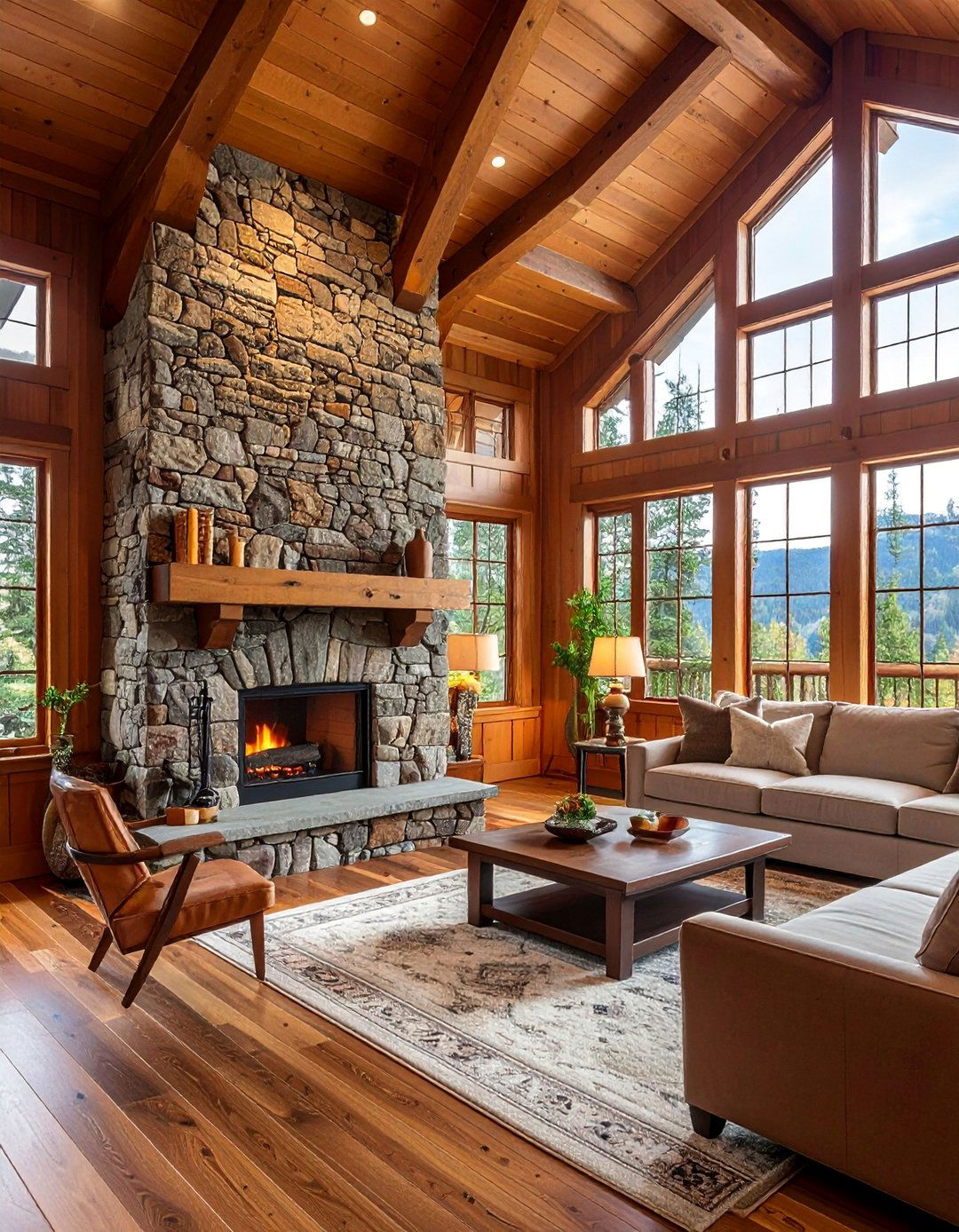
Alongside wood, stone is a key natural material used in Craftsman design to ground the space and connect it to the earth. The most common application is for the fireplace surround, where rugged, irregular fieldstone or smooth river rock can create a powerful and rustic focal point. The cool, solid texture of the stone provides a beautiful contrast to the warmth of the surrounding wood. Stone can also be used for flooring in an entryway leading into the living room or as an accent on the base of columns. Integrating stone enhances the room's organic feel, reinforcing the style's commitment to using honest, natural materials in the home.
26. A Craftsman Living Room with a Picture Rail
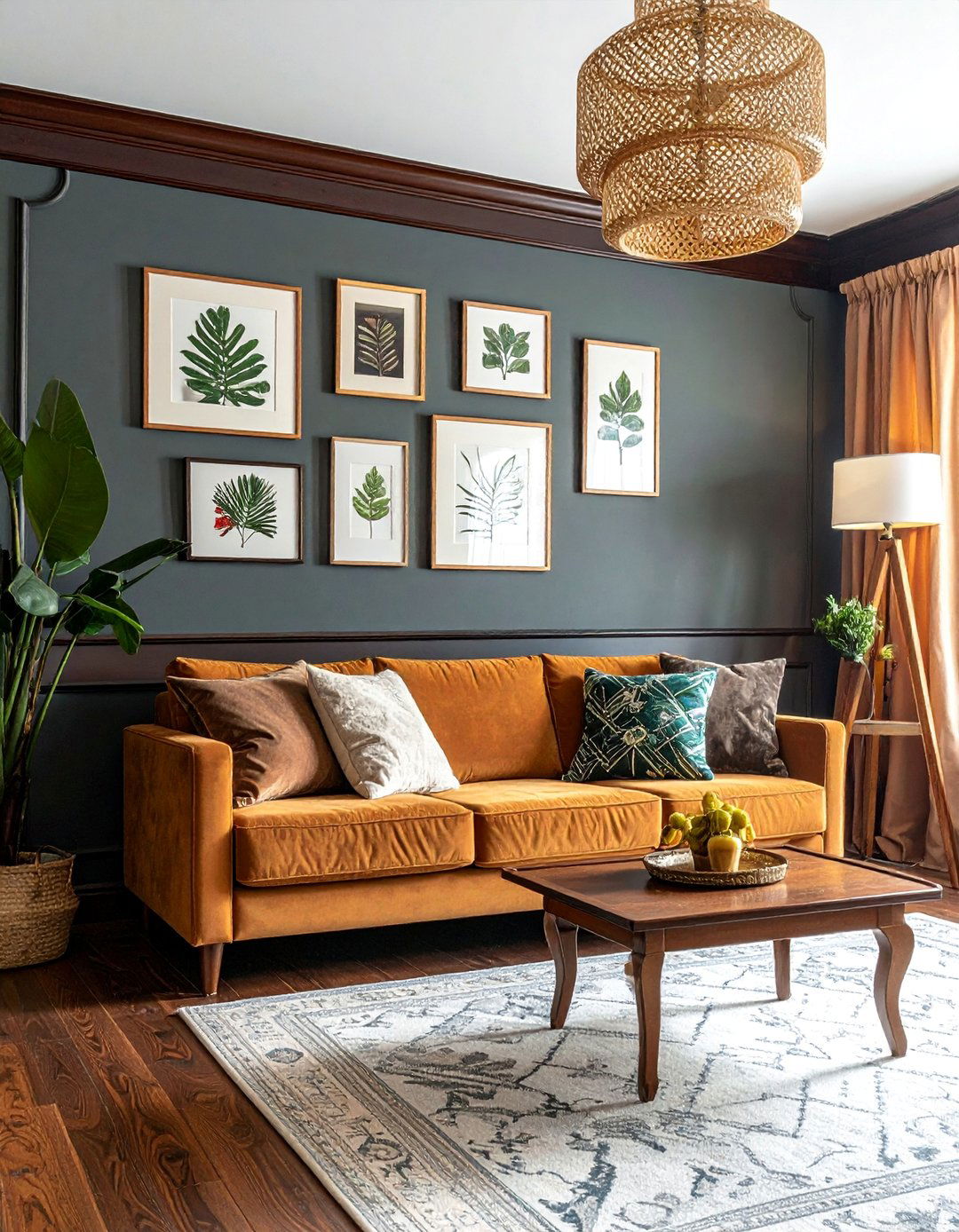
A picture rail is a traditional and practical feature that adds character to a Craftsman living room. This thin strip of molding is installed a foot or two below the ceiling, creating a distinct visual break on the wall. Its primary function is to allow for hanging artwork from hooks and wires without damaging the plaster walls. This flexibility lets you easily change and rearrange your art displays. The space above the rail is often painted the same color as the ceiling, which can make the room feel taller. The picture rail itself, typically made from the same wood as the trim, contributes to the room's layered architectural detail and historical charm.
27. Craftsman Living Room with a Bay Window
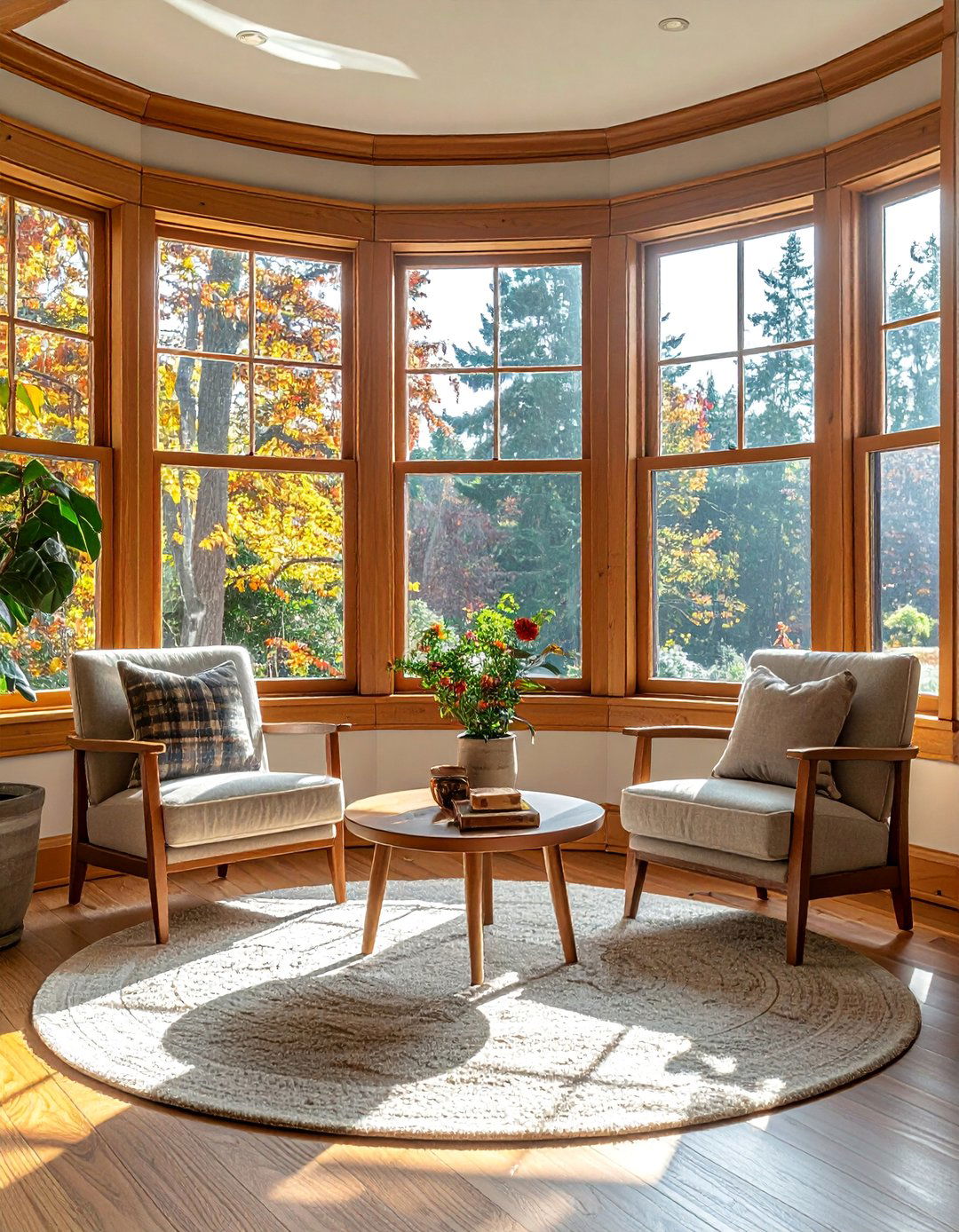
A bay window is a beautiful architectural feature that enhances a Craftsman living room by bringing in abundant natural light and creating a sense of spaciousness. The multiple angles of the bay add architectural interest and provide panoramic views of the outdoors, reinforcing the connection to nature. Frame the bay window with substantial wood trim to highlight its structure. This area is the perfect spot to create a cozy nook, often with a built-in window seat or a pair of comfortable armchairs and a small table. The light-filled alcove becomes an ideal place for reading, conversation, or simply enjoying a quiet moment, adding both beauty and functionality to the room.
28. Minimalist Approach to Craftsman Design
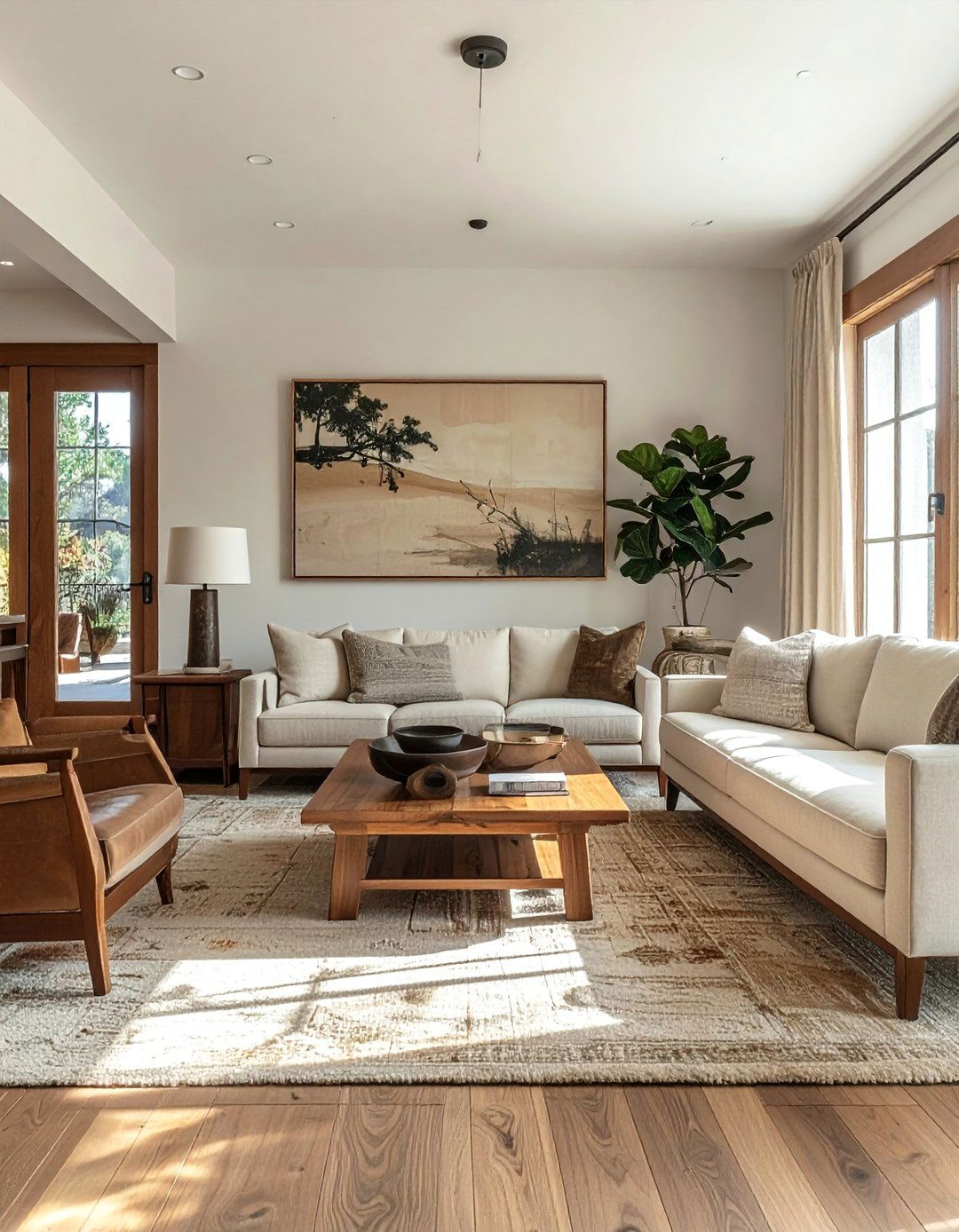
While rich in detail, the Craftsman style can also be interpreted with a more minimalist approach for a modern feel. The key is to focus on the core principles: clean lines, natural materials, and uncluttered spaces. Choose a few high-quality, well-designed pieces of Mission-style furniture rather than filling the room. Keep the color palette simple and neutral, relying on the warmth of the wood and the texture of natural fabrics to create interest. Emphasize the architectural elements like the fireplace and built-ins, keeping decor to a minimum. This restrained approach highlights the inherent beauty of the craftsmanship and materials, creating a serene and timeless living room that feels both historic and contemporary.
29. Incorporating an Antique Grandfather Clock
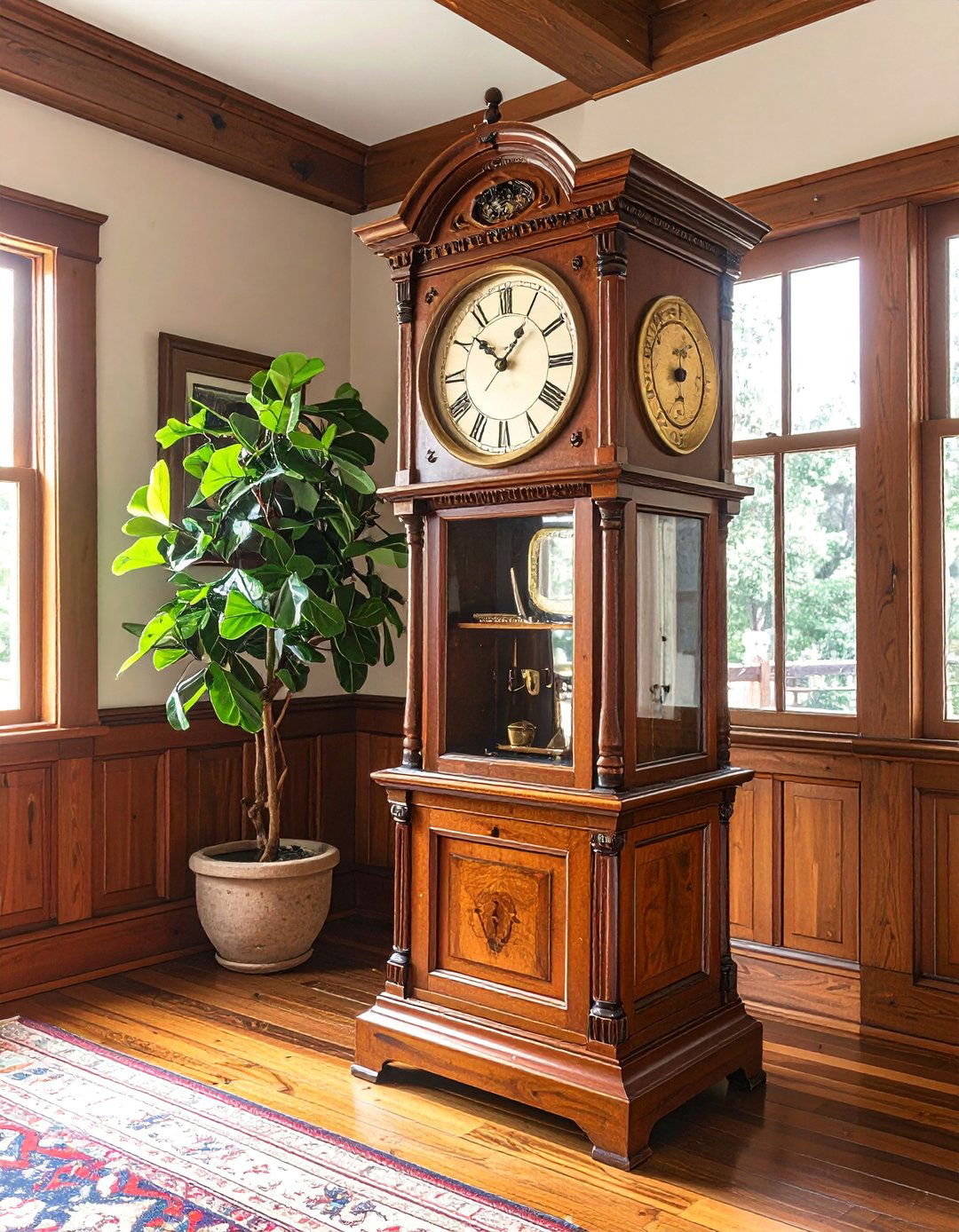
An antique grandfather clock is a stately and fitting addition to a Craftsman living room, echoing the style's appreciation for fine woodworking and enduring quality. Choose a clock with a simple, straight-lined wooden case, preferably in oak or mahogany, that complements the Mission-style furniture. Its tall, vertical form can balance the horizontal lines of wainscoting and mantels, and its gentle chiming adds a layer of auditory warmth and nostalgia to the home. Placed in a corner or alongside a doorway, a grandfather clock serves as a functional timepiece and a beautiful piece of art that speaks to a sense of history, permanence, and handcrafted tradition.
30. A Craftsman Living Room with a Wooden Ceiling
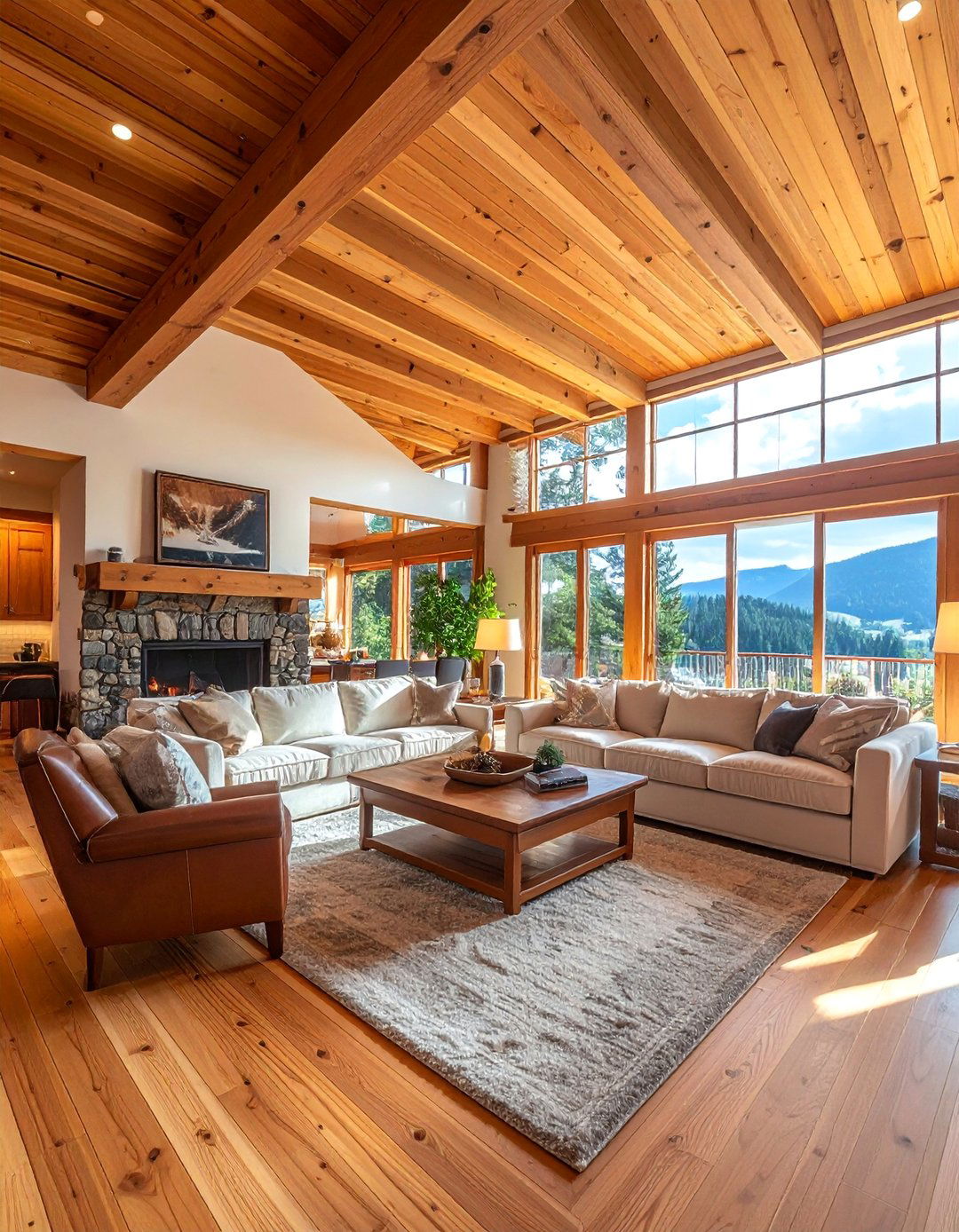
For a truly immersive and cozy Craftsman living room, consider covering the entire ceiling with wooden planks or panels. This treatment envelops the space in the warmth and texture of natural wood, creating a rustic yet sophisticated atmosphere reminiscent of a mountain lodge or historic bungalow. Tongue-and-groove paneling in a light-toned wood like pine or fir can keep the room from feeling too dark, especially when paired with exposed beams in a contrasting stain. This bold design choice makes a dramatic statement, fully embracing the Craftsman ethos of celebrating wood as a primary design element and turning the ceiling into a captivating architectural feature.
Conclusion:
A Craftsman living room offers a timeless and welcoming aesthetic by prioritizing natural materials, handcrafted details, and functional design. Key elements like rich wood trim, built-in features, Mission-style furniture, and an earthy color palette combine to create a space that is both cozy and architecturally significant. By focusing on quality craftsmanship and a strong connection to nature, this style provides a durable, beautiful, and comfortable environment. Whether you incorporate a few key elements or embrace a full renovation, the principles of Craftsman design will result in a living space with enduring appeal.

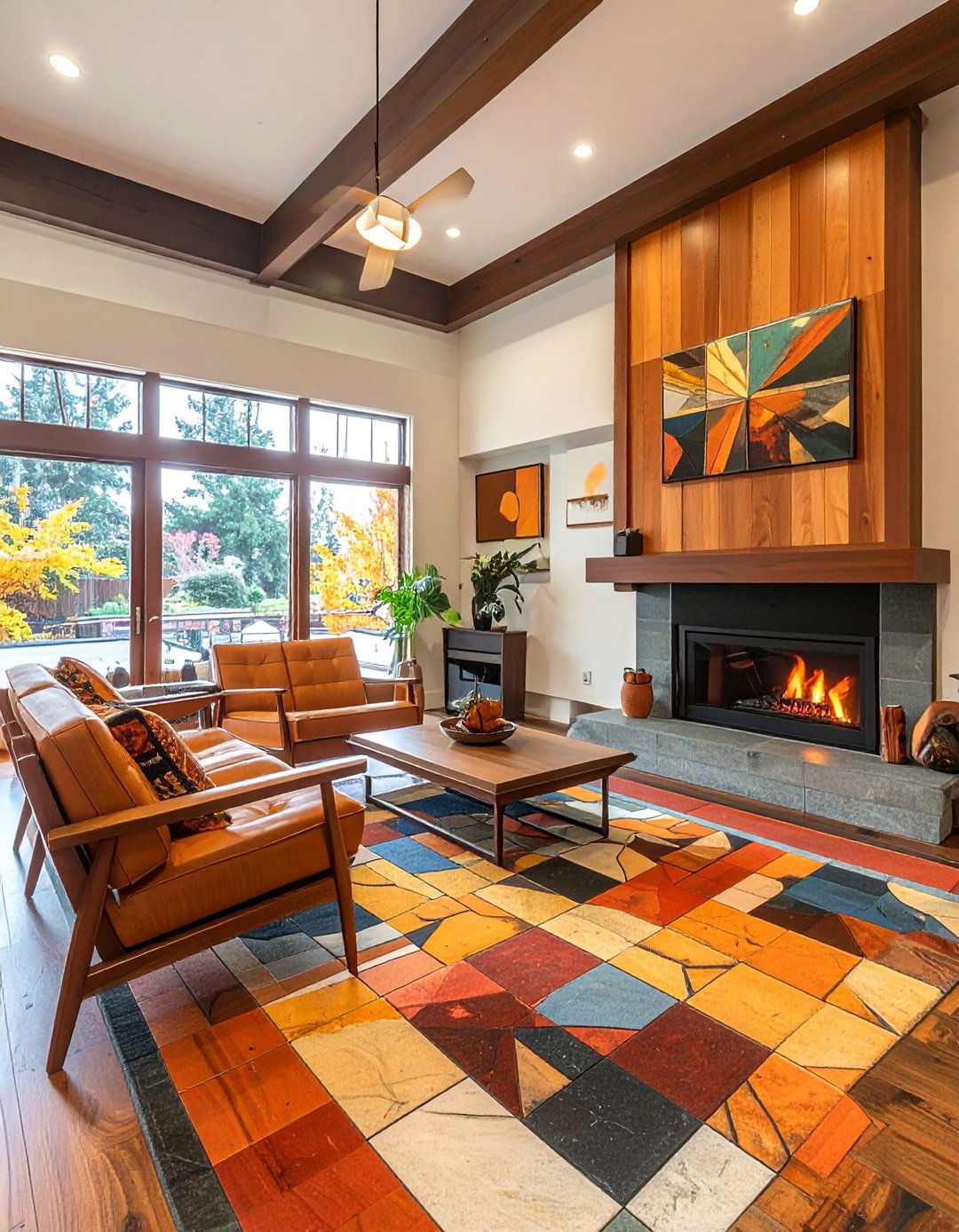
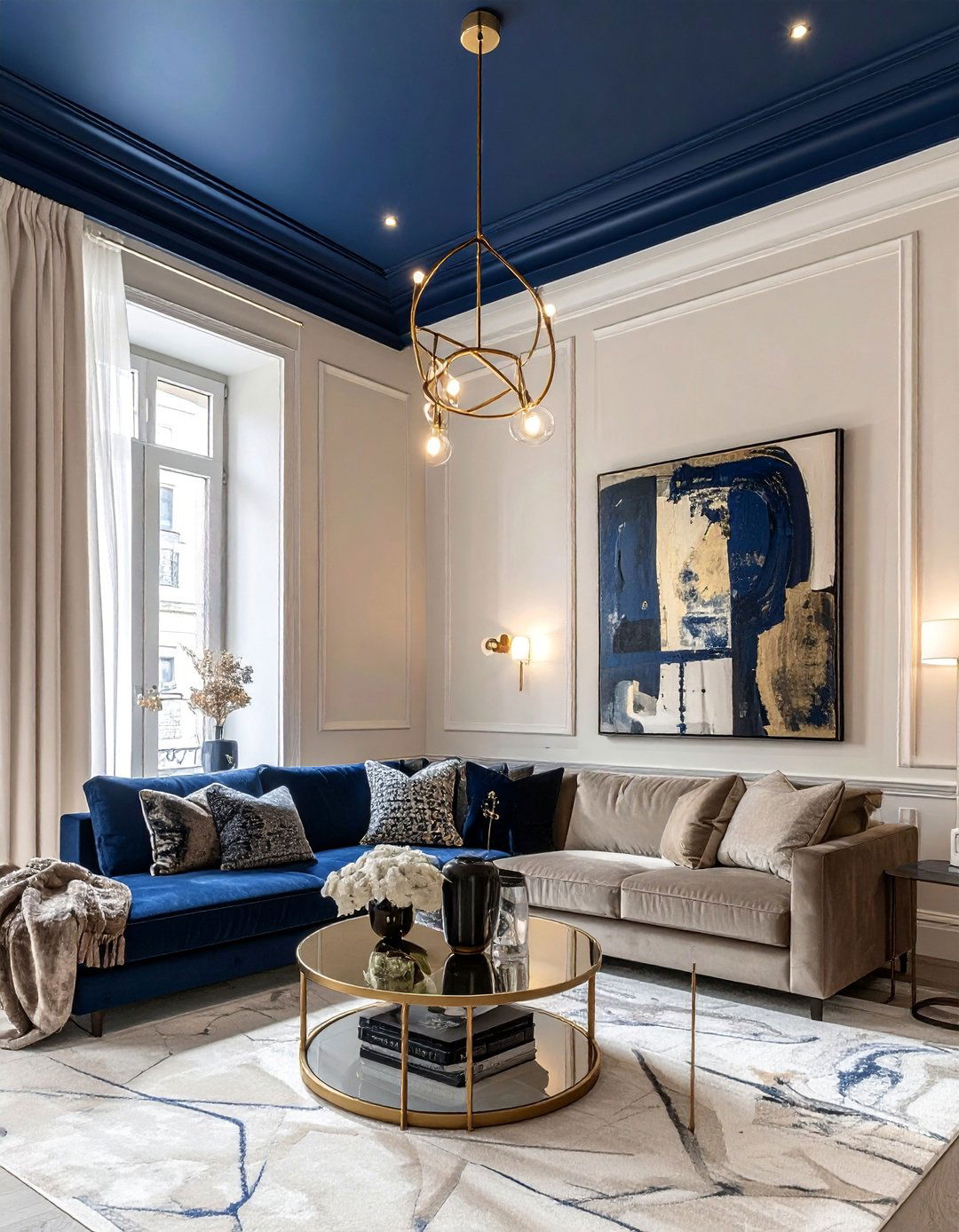
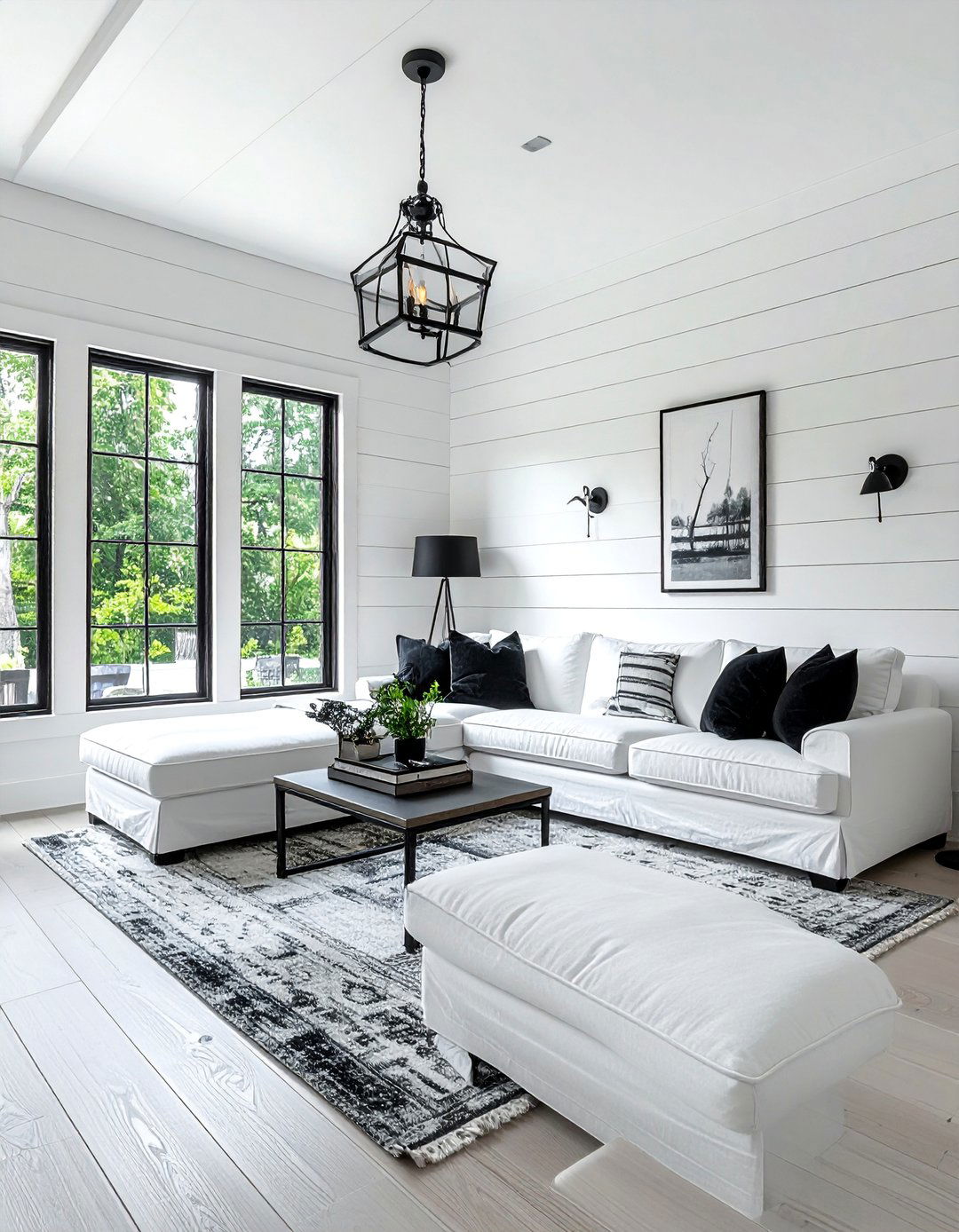
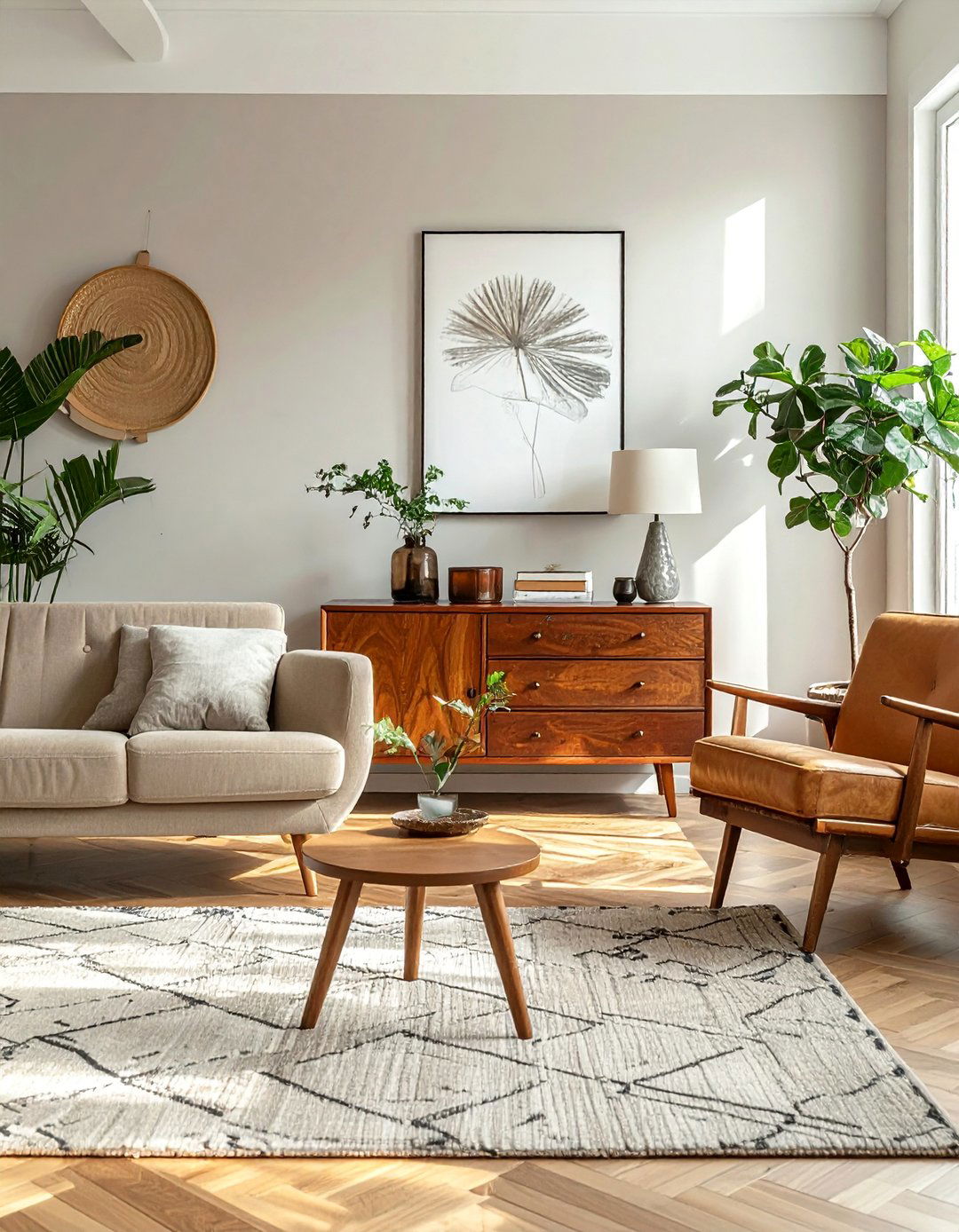
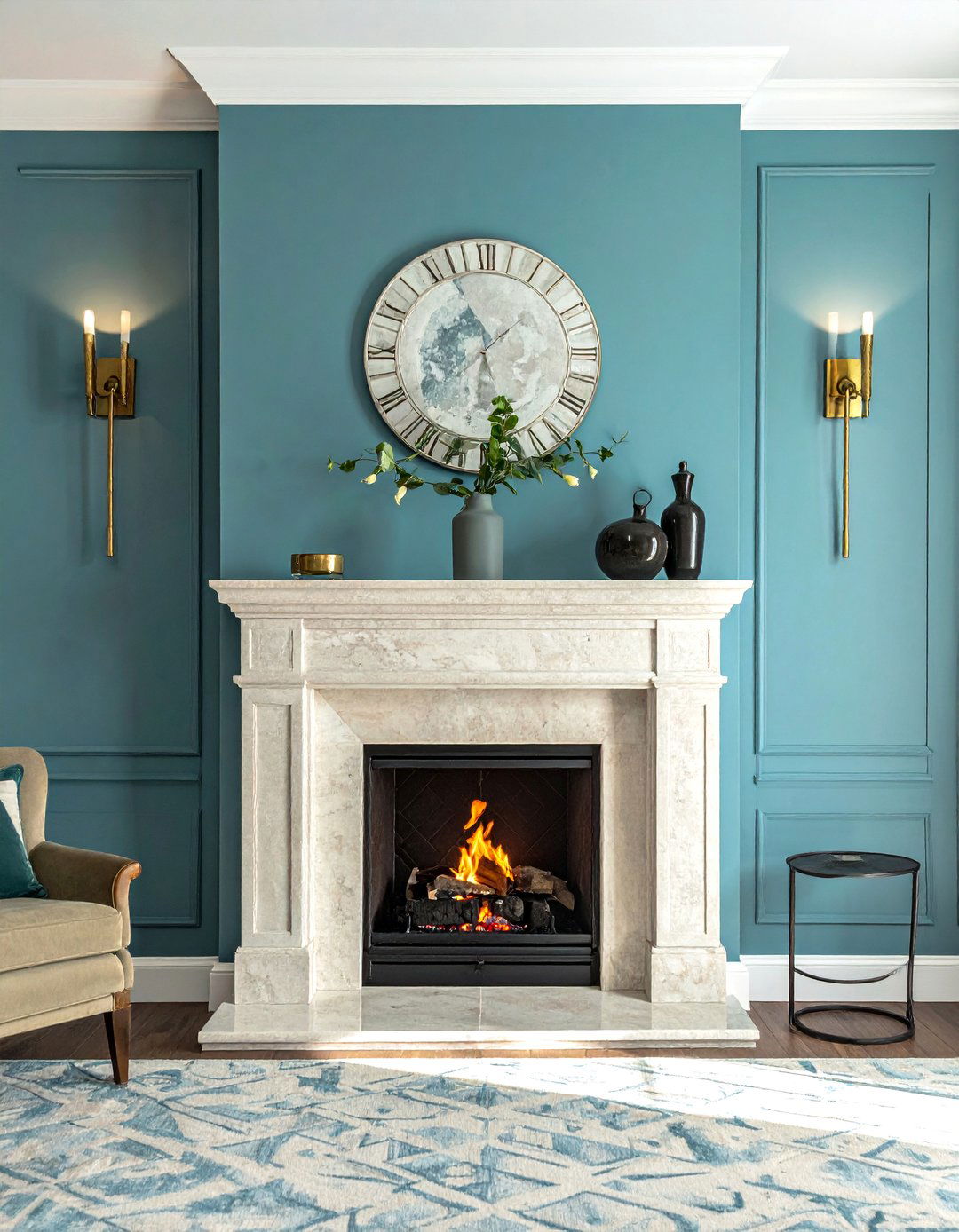
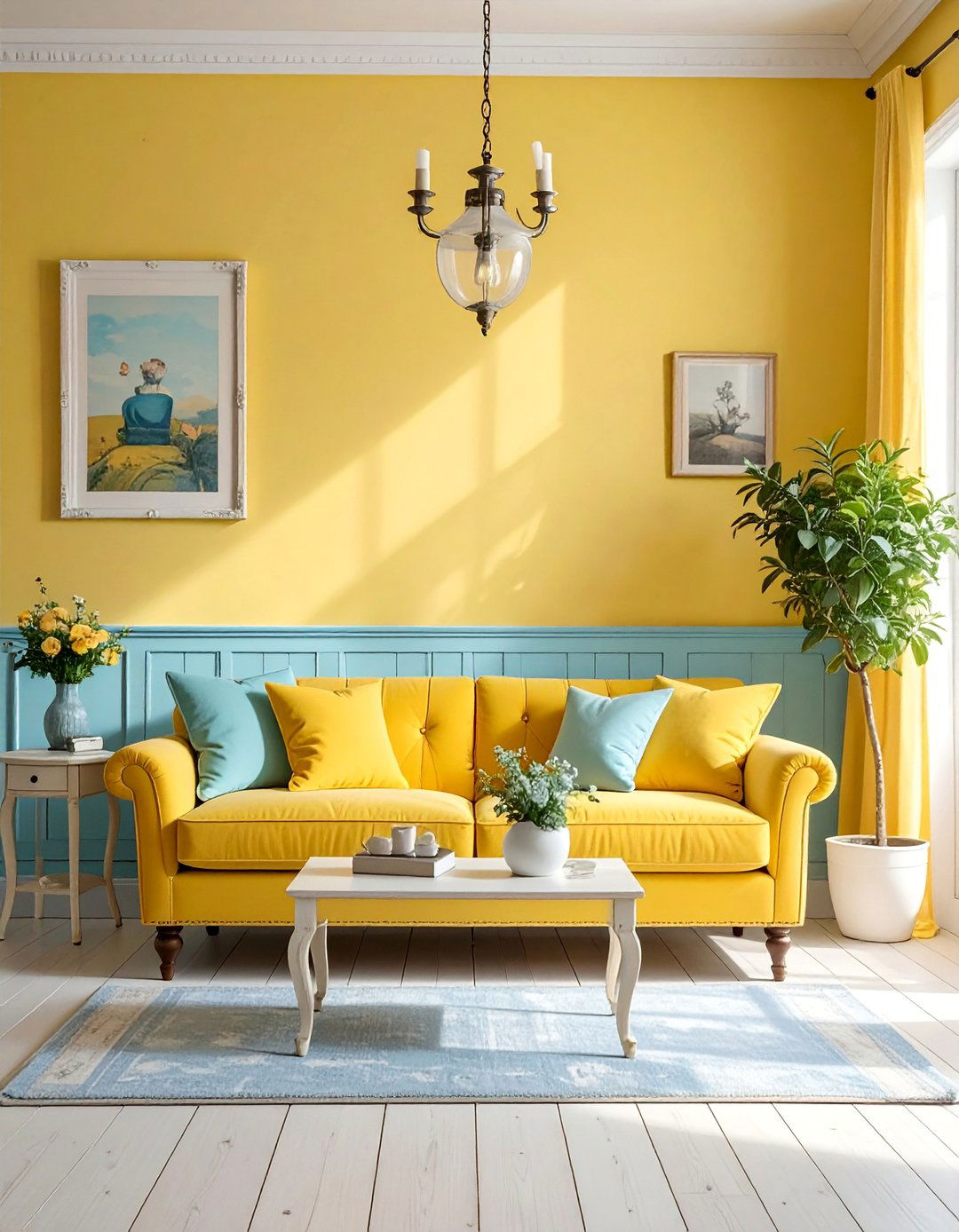
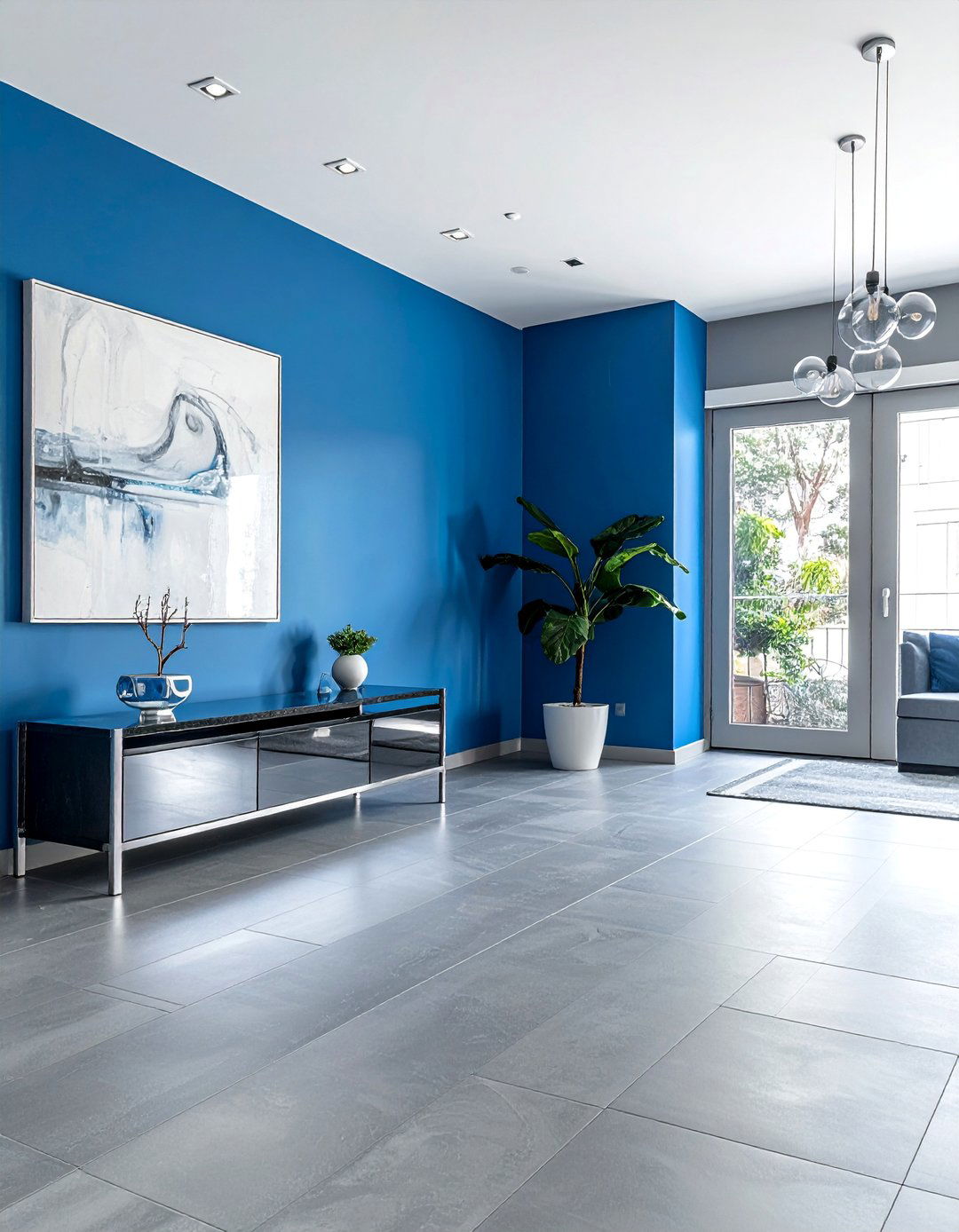
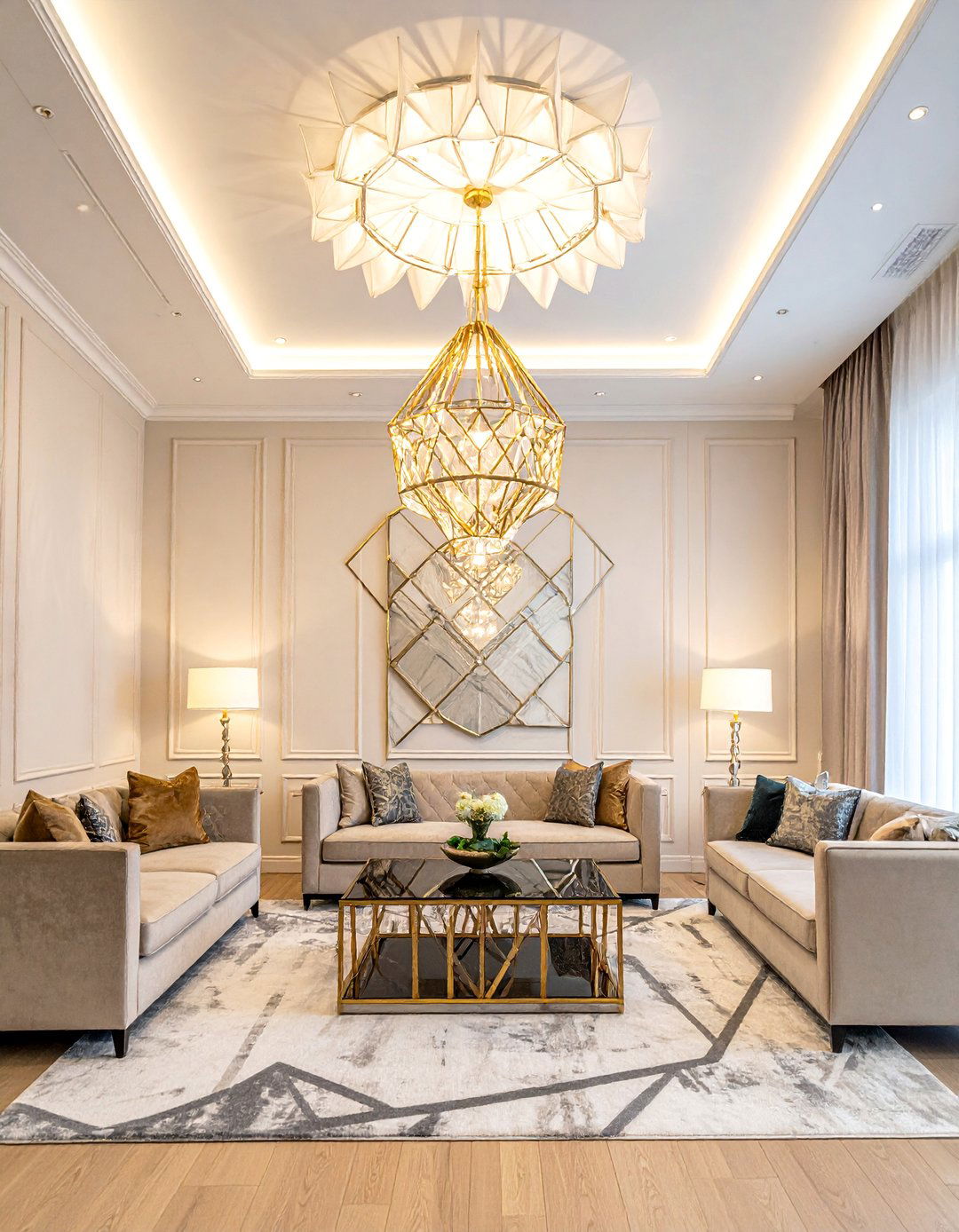
Leave a Reply